




NIE Network’s Trevor Harron, tells us about his new regional manager role and how they are working to improve things on the ground.









At MCS Group, we know the truth about talent. From finding the ideal candidate, to keeping them happy and even just keeping them, we listen to the industry and know what business leaders want. Our understanding of the issues facing today’s employers will help guide you to the right people with the right mindset from the outset.
To find out how we can help your business or organisation to find and retain the best people, visit our website or call us on 028 9023 5456 or email us at talent@mcsgroup.jobs












Managing Editor: Olivia Stewart Interviews: Emma Deighan Publisher: Chris Sherry Advertising Managers: Lorraine Gill & Julie Patterson Editorial Assistant: Joanne Harkness Email addresses: olivia.stewart@northernirelandchamber.com / l.gill@ulstertatler.com / j.patterson@ulstertatler.com Websites: www.northernirelandchamber.com / www.ulstertatler.com Publisher: Ulster Tatler Group, Unit 26 Ormeau Businss Park, Belfast, BT7 2JA Tel: 028 9066 3311 Printed by: W&G Baird, Antrim. Front Cover Photo by: Paul Moane, Aurora Photography.


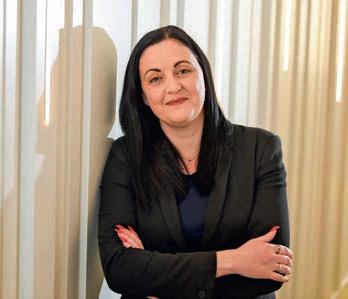




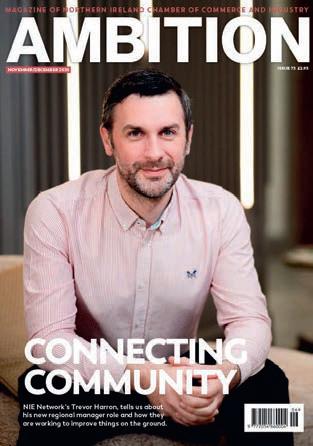


Catalyst, Northern Ireland’s science and technology hub, has announced a new partnership with Ulster University that will embed entrepreneurial thinking and innovation into the academic experience of more than 450 second and final year students across the Faculty of Computing, Engineering and the Built Environment.
The initiative, known as IDE Lab @ CEBE, will be delivered by Catalyst in collaboration with Ulster University’s Research & Innovation, School of Engineering (Belfast Campus) and School of Computing, Engineering & Intelligent Systems (Derry~Londonderry Campus).
It will incorporate Design Thinking and Disciplined Entrepreneurship workshops into second and final year project modules, alongside Innovation Driven Enterprise (IDE) startup hackathons and guest lectures. All elements have been co-designed with academic staff to ensure they are relevant and impactful.
This partnership represents a significant step forward in preparing students for the innovation economy. By embedding entrepreneurial skills from an early stage, the programme enables students to explore the commercial potential of their academic work, consider venture creation and develop the mindset needed to succeed in a fast-changing global environment.

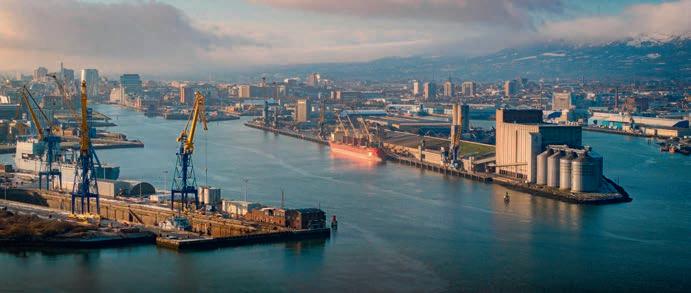
Belfast Harbour handles goods and freight valued at £26.7 billion each year, enabling more than 15% of Northern Ireland’s total economic output – around £8.8 billion in GVA annually, through trade activity alone – according to new research.
The report, Belfast Harbour: An Economic Driver for the Region, was commissioned by Belfast Harbour and produced by the Ulster University Economic Policy Centre (UUEPC) and Grant Thornton.
The research analysed activity in the port in 2023 and found that three-quarters of the 24 million tonnes of trade handled by Belfast Harbour that year was goods-related, accounting for over 67% of all goods moved through NI ports. This includes raw materials, components and equipment that are essential to the competitiveness and resilience of the region’s key industries such as agri-food, construction and manufacturing.
This trade activity is estimated to support £8.8 billion in total Gross Value Added (GVA) to the regional economy and equates to 15.7% of NI’s total economic output, supporting over 155,000 jobs, or 16.7% of all jobs in the region and 43.4% of the jobs in trade intensive sectors.
A young schoolboy from Portadown and an 82-yearold retired engineer were crowned Translink ‘Grand Pianists’ 2025 following a Northern Ireland-wide competition that attracted over 70 musicians.
Jacob Purdy (8), won the ‘Under 16’ category, while Denis Hession from Carrickfergus took the title in the adult section, after stunning performances in front of a three-strong judging panel.
Translink Group Chief Executive, Chris Conway, said the final was a fitting end to a regional roadshow that had connected people in stations across Northern Ireland.
During National Childhood Cancer Awareness Month, employees at Aflac Northern Ireland set out to raise funds for The Children’s Cancer Unit Charity (CCUC) with the Three Peaks Challenge, a trek to the Mournes that includes Slieve Binnian, Slieve Commedagh and, finally, an ascent to the top of Slieve Donard.
More than £23,000 was raised and donated to support the Children’s Cancer and Haematology Unit at the Royal Victoria Hospital for Sick Children in Belfast.




South West College has officially launched the Powering Research & Innovation for Advanced Manufacturing (PRISM) project, a transformative €7.6 million initiative designed to support SMEs in developing new and innovative products and processes whilst addressing the decarbonisation challenges that are associated with three sector areas that are conventionally difficult to decarbonise.
The project brings together a consortium of six strategic partners to address the urgent challenges of decarbonisation within the manufacturing sector.
PRISM aims to accelerate the adoption of low carbon technologies among 24 SMEs split across three key manufacturing clusters: mineral processing, polymer processing & composites and agrifood. By leveraging cutting-edge research and innovation expertise, the project will drive economic growth and environmental improvement throughout the region. Activities will be coordinated from SWC’s Omagh campus, with a reach extending across ten counties: Antrim, Armagh, DerryLondonderry, Donegal, Down, Fermanagh, Monaghan, Leitrim, Louth and Tyrone.
The Police Service of Northern Ireland (PSNI) and PwC Northern Ireland held a joint event under PSNI’s Power to Change campaign, focusing on how employers can play a vital role in preventing and addressing violence against women and girls (VAWG).
The event, titled “Power to Change: The Role of Employers in Ending Violence against Women and Girls”, brought together business leaders, policymakers and community advocates to discuss how workplaces can drive positive cultural change and support those affected by abuse.
It was held on 5 November 2025 at PwC’s Belfast office with 140 attendees. It featured insights from experts Dr Sajjan Gohel (London School of Economics) and Dr Louise Crowley (University College Cork), alongside conversations with Women’s Aid, Northern Ireland Housing Executive, PSNI and NICVA. The session challenged business leaders to rethink their strategies and take action.
Violence against women and girls is not only a profound societal issue – it also carries significant economic consequences. According to the Strategic Framework to End VAWG, the estimated economic cost of domestic and sexual violence in Northern Ireland ranges from £730 million – £1 billion annually. From lost productivity and absenteeism to reputational risk and reduced workforce engagement, the impact on businesses is real and measurable. Employers have a unique opportunity to lead change, foster safer communities and support affected employees.
Kestrel Foods, the family-owned company behind the Forest Feast snack brand, has built its reputation on quality, innovation and a deep commitment to sustainability.
Founded in Northern Ireland, the business is setting the standard for responsible food production including focuses on ethical sourcing and waste reduction to community and environmental initiatives.
Through partnership with 3T Power, the team at Kestrel Foods is taking another major step on its sustainability journey: powering its Portadown-based operations with 100% locally generated renewable electricity.
Commenting on its continued support of local businesses, 3T Power Sales Manager John Francis Collins said, “We’re proud to partner with innovative, values-driven companies across Northern Ireland like Kestrel Foods. Our goal is to support them every step of the way as they progress on their sustainability journey.”
IT and telecommunications provider b4b Group has donated £8,000 to its dedicated charity partner, Hope 4 Life NI. The funds were raised through the company’s annual charity golf day, held at Galgorm Castle Golf Course, which brought together clients, partners and staff for a day of friendly competition.
The money will help Hope 4 Life NI continue to deliver adult training initiatives and prevention along with its early intervention workshops, designed to support children and young people with problem solving and resilient thinking skills to improve wellbeing.

The Northern Ireland Football League has announced a new partnership with Women in Football (WIF), which will strengthen professional networks and development for the country’s female workforce.
The link-up will see the highly acclaimed Women in Football Leadership Programme run in Northern Ireland for the first time. The programme will offer WIF members in the region an opportunity to enhance their skills, self-confidence and networks in a uniquely supportive environment.
Save money, Reduce emissions, Boost employee benefits


Get your employees on the road to zero emissions with our local Electric & Plug-in Hybrid Salary Sacrifice scheme. With a huge selection of cars plus local all-inclusive service and expert support, our simple solutions will help you save more.
From a fleet of one, to a fleet of many.
Talk to us today about how our Salary Sacrifice scheme could help your organisation. 028 9084 9777


FinTrU and Ulster University have announced a new partnership to boost financial services talent in the North West.
FinTrU and Ulster University’s Department of Global Business and Enterprise, part of the Ulster University Business School (UUBS), have announced a new partnership designed to strengthen pathways into financial services and enhance employability opportunities for students in the North West.
As part of the partnership, the FinTrU IOC Exam Fund will support first year students studying the BSc (Hons) Accounting and Finance, BSc (Hons) Accounting with Computing and BSc (Hons) Accounting with Education programmes. The fund provides up to ten scholarships each academic year for students undertaking the ACF150 Introduction to Financial Markets, Securities and Investments module.
Through this initiative, recipients will have the opportunity to complete the Chartered Institute for Securities and Investment (CISI) Introduction to Securities and Investment qualification – helping them gain early professional accreditation and strengthen their future career prospects in finance.
Henderson Technology, the retail technology company owned by Henderson Group and based in Mallusk, has announced its acquisition of the hospitality point of sale company, PowerEPOS. PowerEPOS, based in London and Liverpool, has been supplying point of sale and back-office technology to hospitality companies for 38 years. All 13 support and install staff based across two premises in England, alongside developers based in Australia and Portugal, will remain in employment. The acquisition sees the formation of a new company, Power EPOS Technologies, to take the business forward.
Weev, a Belfast-based electric vehicle (EV) infrastructure company, has announced a major new partnership with British Gas, one of the UK’s most trusted energy suppliers, to deliver home EV charger installations across Northern Ireland. The partnership will see Weev act as the Northern Ireland installation partner for British Gas, supporting its customers as they make the transition to electric vehicles.









What will your legacy be? A gift in your Will to Queen’s can become many things. For researchers like Professor Denise Fitzgerald it can enable ground-breaking research into Multiple Sclerosis and related illnesses. A legacy to Queen’s is more than what you leave behind. It’s also what you hand on. What will your legacy be?









Economy Minister Dr Caoimhe Archibald joined Tourism Ireland at the World Travel Market (WTM), the world’s largest travel fair to promote Northern Ireland.
As Tourism Ireland prepares for 2026, the organisation had a significant presence at WTM – joined by tourism companies from around the island, including around 25 companies from every corner of Northern Ireland. WTM is the largest B2B event in the global travel and tourism calendar and marks the beginning of the promotional drive overseas for 2026.
Tourism Ireland helps over 250 SMEs selling Northern Ireland through overseas events like WTM, where they connect with tour operators who bring visitors at scale. During WTM Northern Ireland tourism companies engaged in around 1,200 commercial meetings, delivering overseas tourism business worth millions of pounds.

Southern Regional College (SRC) has partnered with the Southeast Higher Education/Further Education/Industry Cross-Border Alliance (SECBA) project, officially launched at Dundalk Institute of Technology (DkIT) on 24 October 2025. Supported by PEACEPLUS and managed by the Special EU Programmes Body (SEUPB), this landmark initiative brings together higher education, further education and industry to address critical skills shortages across the south-east region of Northern Ireland and the border counties of Ireland. Running until October 2028, the €9.7 million SECBA project will bridge the gap between education and employment, ensuring that learners gain industry-relevant skills while employers access a skilled and futureready workforce.
Custom software specialist GCD Technologies has scooped Tech Company of the Year (Small) at the 2025 UK Business Tech Awards which celebrate the best of the UK’s technology sector.
Operating for over 25 years, GCD Technologies is an innovation and technology partner for many leading organisations, offering a full suite of software services, from AI strategy and development, custom digital products and apps, to digital transformation projects.
Its clients range from startups with innovative app ideas to enterprises searching for a digital partner and include Coca Cola, Fane Valley and McCauslands.
Having grown to a team of over 50, the firm has doubled down on its efforts to provide forward-thinking solutions, particularly around practical AI integration.
Delighted with the recent win, Andrew Gough, Managing Director at GCD Technologies, said:
“This award not only recognises the dedication we have to providing the best services to our clients, but reflects our ongoing commitment to our team, our growth and becoming a leader in innovation.
“The custom software landscape is evolving rapidly, and in response we’ve devised a bold, future-focused strategic plan designed to drive sustainable growth and position us as leaders in smart, scalable software development.”
A&L Goodbody (ALG) will continue its sponsorship of the Ulster Rugby Business Club for a further three years, following a highly successful inaugural year of networking events.
Launched last year in the A&L Goodbody Lounge, the Business Club has quickly become a hub for local and international business leaders to connect, share insights and build relationships. Members benefit from a programme of quarterly events featuring high-profile speakers and providing unique opportunities to engage with industry experts and peers in an inspiring setting.








John Doris Sales Director, Business Applications, Telefónica Tech
You’ve probably heard a lot about AI transformation lately: how it’s reshaping industries, redefining jobs, and rewriting what productivity means. But what does that actually look like for most organisations?
The answer might lie in the rise of what’s being called the Frontier Firm, a term for the kind of business that doesn’t just keep up with change, but helps define it.
WHAT’S A FRONTIER FIRM?
The idea goes back more than a decade. After the 2008 financial crash, researchers noticed that a small group of companies didn’t just survive the turbulence; they thrived. These “frontier” firms were faster to experiment, smarter about scaling ideas, and better at turning technology into tangible results.
Today, that same energy is back, fuelled by artificial intelligence. Companies that can adapt and use AI effectively are creating a new standard for innovation and resilience, not just in tech, but across every sector, from finance to healthcare to retail.
At Telefónica Tech, we see this firsthand. Being a Frontier Firm isn’t about size or budget, but about mindset. It’s about curiosity, adaptability, and a willingness to turn ambition into action.
When we meet customers and prospects across industries, one theme stands out – almost everyone wants to harness AI, but many are still stuck in pilot mode. There’s huge enthusiasm for what AI could do, but less clarity on how to scale it safely and effectively.
Whether it’s automating tasks, analysing data in real time, or improving
customer experiences, AI is already proving its value. The challenge is embedding it into the way businesses actually work, aligning it with goals, people, and processes.
That’s where the concept of the Frontier Firm becomes useful. It’s not about chasing the latest tools; it’s about building an organisation that’s ready for constant change.
Frontier Firms experiment, learn, and adapt quickly. They see technology as an enabler, not a magic fix. They invest in people as much as platforms.
In practical terms, this means treating AI as Assistive Intelligence; a tool to empower people, not replace them. The businesses that thrive will be those that give teams the freedom and confidence to use AI creatively and responsibly.
As one customer told us recently: “The best organisations aren’t just building better systems; they’re building better people.”
Bridging the gap between ambition and real-world results often takes collaboration. Technology partners like Telefónica Tech help organisations move from experimenting with AI to embedding it in everyday operations. Using platforms like Microsoft Azure, Dynamics 365, and Power Platform, businesses can modernise existing systems, connect data more effectively, and build secure foundations for AI innovation, without having to start from scratch.
These partnerships aren’t just technical. They help organisations reimagine how they work, predict
challenges before they happen, and unlock new value from the tools and data they already have.
The potential is enormous. Across the UK, research suggests that closing the “digitalisation gap” could add hundreds of billions to the economy over the next decade. But more than that, becoming a Frontier Firm builds resilience; the ability to adapt when markets shift or new technologies emerge.
And as one business leader put it to us: “You don’t need to be perfect to get started.” The key is to start somewhere –test, learn, and evolve.
Whether you’re exploring AI for the first time or scaling existing projects, the mindset of the Frontier Firm applies to everyone. It’s about moving from curiosity to capability, and from pilot projects to everyday progress.
At Telefónica Tech, we’re on that journey too – using AI to boost our own efficiency, rethink how we work, and help our customers do the same. Because becoming a Frontier Firm isn’t about reaching a finish line. It’s about leading the way forward.
John, who is from Dungannon, is sales director, Business Applications, at Telefónica Tech. As a leading Microsoft partner, Telefónica Tech has many years of experience implementing and supporting Microsoft AI Business Solutions (formerly known as Business Applications) in a range of industries from FSI to public sector, to retail, manufacturing and beyond.













Eyelid reduction (Blepharoplasty)
Brow lift
Split earlobe repair
Ear Reshaping (Pinnaplasty)
Lip lift






Vicky Green, Associate Director Business Development, Andras House
It’s fair to say that hospitality runs through my veins. Both my parents were hoteliers, meeting on the job in what I describe as a ‘match made in hospitality heaven’.
My upbringing involved moving around the UK from hotel to hotel, as mum and dad opened and ran many establishments. This slightly unusual upbringing gave me life skills and resilience that have served me well over the course of my career.
On leaving school I gave college a go and enrolled in a media studies course; I was adamant I wasn’t going into hospitality! However, after a few attempts at different subjects and jobs I finally moved into the pub trade. I sat my British Institute of Innkeeping exams and National Licensee’s certificate.
I joined an agency, which sent to me pubs around the country to step in when someone was ill or on holidays. I loved the work and the lifestyle that came with it, being right at the heart of the community and getting to meet people from all walks of life. For a while I ran a pub in North Wales then relocated to Canterbury and at 22, I became a licensee for the first time, making me the youngest landlady in England – albeit for a brief period. I was so proud of that and it’s a big regret that I didn’t take my name plaque above the door when I left!
My heart was never far from hotels and on relocating to Belfast with my Liverpoolborn husband Andy almost 25 years ago, I found myself back in the business. When I first moved to Northern Ireland I secured a job as a receptionist at the Europa Hotel and stayed there for two years in several different roles. In 2003, I took up a new post at Andras House in the reservations department and have been there ever since, holding four key roles which were the stepping stones to my current position.
When I turned 40 in 2017, Rajesh Rana, director of Andras Hotels, appointed me to the post of associate director of business development. As such, I oversee all things

commercial of the business’s portfolio for the group’s 11 properties.
This includes over 1,000 bedrooms across several international hotel brands including IHG, Accor and Hilton. We are currently undertaking a significant expansion programme, including the future openings of Adagio Aparthotel and Yotel in Belfast, and just recently we launched the Marcus Hotel Portrush, part of the Tapestry Collection by Hilton.
In late 2024, I was appointed President of the Northern Ireland Hotels Federation, succeeding Eddie McKeever. The hotel industry is really my natural calling and being made President of the NIHF is my proudest moment to date. It is a huge privilege and a role I take very seriously. The support I get from Rajesh is integral in allowing me to give one hundred percent to this position.
I have been privileged to be part of a tourism explosion in Northern Ireland. In comparative terms to our sister cities such as Liverpool and Glasgow, tourism is not that old in Northern Ireland but over the last 20 to 30 years, we have seen millions invested in the industry here, which has had a knock-on effect on the local economy supporting everything from transport to restaurants and bars and retail. Tourism and hospitality are thriving, and I’m delighted to be part of that journey. The industry has also massively improved in terms of reputation and a career of choice. It offers a great mix of education and life skills which I truly believe is an essential balance for personal growth. There are so many diverse roles and opportunities and hopefully my story demonstrates that you really can go as far as your ambition takes you.
Fostering inclusive workplaces isn't just 'the right thing to do' – it's a business imperative.




By shaping a workplace culture that fosters collaboration, inclusion, and fresh perspectives, you create an environment where employees thrive –and your business grows. g a

At Encirc, we are guided by the principles of the Diversity Mark charter, which perfectly reflects our core values and is helping us create an environment where everyone can grow, contribute, and belong.
At Encirc, we are the of the Mark charter, which reflects our core values and is us create an where everyone can grow, contribute, and
Sean Murphy, Managing Director, Encirc
Sean Murphy, Director, Encirc
Take the first step
Visit our website to book a call with one of our team
Take the first step our to book a one our team


Jane Shaw Health Coach & Therapist
The Biology of Trauma is the title of a recently published book by Dr. Aimie Apigian MD, and it has also been the central theme of my own professional work over the past two decades. In essence, our life experiences are expressed in our physiology, good and bad. What happens to us shapes our biology, not just our emotions or beliefs. Dr. Aimie’s book builds on an expanding body of research and clinical insight showing that di cult, overwhelming experiences can lead to chronic health conditions such as autoimmune diseases and inflammatory syndromes.
She is the latest prominent voice to join a growing movement of physicians, among them Dr. Gabor Maté, Dr. Bessel van der Kolk, and Dr. Daniel Siegel, who are reframing trauma not as a purely psychological problem, but as a biological adaptation. Their hopeful message enables an understanding of how trauma takes root in the body, and thus also helps us learn how to heal it.
Trauma, when stripped of its dramatic associations, can be understood simply as the body system becoming overwhelmed. It isn’t necessarily about what happens to us, but about what happens inside us as a result. Two people might live through the same event – one emerges shaken but resilient, while the other develops chronic anxiety, pain, or illness. The difference lies in biology, not willpower.
Dr. Apigian offers a compelling way to understand what causes overwhelm:
• “Too much, too fast”—the body is flooded by an event that exceeds its capacity to cope, such as a car accident, a sudden loss, or a violent encounter.
• “Too little, for too long”—a prolonged lack of safety or support, such as ongoing neglect, chronic stress, or emotional abuse.
In both cases, the nervous system shifts into survival mode. The body prioritises safety over growth, vigilance over rest, and protection over connection. Over time, this can rewire our physiology. Hormones, immune responses, digestion, and even gene expression can be affected. We become stuck in patterns of hyperarousal (fight or flight) or hypoarousal (freeze or collapse).
Dr. Apigian describes this as the biology of trauma, a state in which the body’s survival responses never fully switch off.
The power of this theory becomes real when we see it lived out.
A client, a successful executive, came to me with chronic fatigue and anxiety. She described her life as “constantly firefighting.” Her adult nervous system continued a pattern formed in childhood in a volatile household, where she learned early that calm could be shattered at any moment. Her internal alarms kept ringing even when her external world was safe. Through somatic-oriented bodywork for nervous system regulation, she gradually returned to a healthier, calm, energised rhythm.
Another client, a small business owner, suffered from autoimmune flare-ups that defied medical explanation, but which impacted her business. Tracing her health history alongside her life experiences, a clear pattern emerged of fear and appeasement. Each major flare followed a period of conflict and relationship breakdown. Her symptoms eased not by talking about the past,
but by teaching her body that it was no longer in danger. She described the process as “coming home to myself.”
These stories illustrate a profound truth: our bodies keep the score, as Bessel van der Kolk famously wrote. They record every unprocessed shock, every moment of helplessness, every long stretch of tension. And unless we learn to read that language, we may continue to chase symptoms without resolving the root cause.
Healing is not a linear process, and often there is no quick fix for an overwhelmed body system. However, there is enormous potential for recovery when we work with the body rather than against it.
The key is regular somatic practices and somatic-oriented therapies that support the nervous system to relearn safety through physical experience rather than intellectual insight. This might begin simply with embodiment coaching, breathwork, mindful movement, and learning to release physical tension.
For those in high-pressure professions, burnout, exhaustion, and chronic stress are not moral failings but biological signals that our systems are out of balance. Learning to listen to these signals is both a personal and professional act of wisdom.
Understanding the biology of trauma provides a roadmap for a healthier, more sustainable way of living and leading. In a world moving ever faster, perhaps the most revolutionary act is to slow down, shake off our appeasement shackles, and find our own rhythm again.
Ref: Apigian, A (2025) The Biology of Trauma. BenBella Books, Inc: Dallas, TX


Andrew Muir Minister of Agriculture, Environment and Rural Affairs
In his latest book, economist Nicholas Stern boldly declares:
‘Climate action is the growth story of the 21st century’. Truer words have never been spoken on the climate crisis.
Investing in our climate and our environment is not a cost; it is an opportunity for our economy and for business.
It means lower energy bills, improved air quality, new technologies driving innovation and good, green jobs, as well as social and economic returns on every pound put into meaningful climate action.
No longer are developing our economy and protecting the environment seen as mutually exclusive.
In many ways, businesses in Northern Ireland have been ahead of government in understanding this. Climate action is good business.
That’s why, under my leadership, DAERA is firmly focused on seeing these goals pursued hand in hand.
Since the institutions returned, we have taken a lot of ‘firsts’ in Northern Ireland – our first ever Environmental Improvement Plan to drive nature recovery; the setting of carbon budgets committed to by all Executive parties; a ringfenced budget for agri-environment and a Just Transition Fund for agriculture; our first Peatlands Strategy – the list goes on.
Soon we will have our first Climate Action Plan, firmly setting the direction of travel for decarbonising our economy.
And whilst there have been calls to renege on our climate commitments, I know that businesses require certainty.
There will be no rolling back while I am Minister.
Because, as well as presenting opportunity, climate change is a very real threat to our economy, our environment and our communities.
Extreme weather events like Storm Eowyn, the devastating wildfires in the Mournes and Sperrins, and the bluegreen algae crisis at Lough Neagh are all clear manifestations of the challenge.
There is not a single business model that does not rely in some way on our natural environment or the health and wellbeing of our workforce and customers.
And we should all take heed of the OBR’s warning that climate change could cost 8% of the UK’s GDP by the 2070s.
Burying our heads in the sand or ignoring the challenges we face around water quality or how we manage our waste is simply not an option. Recognising the challenges and collectively working together to address them is a must.
Whilst all of us must play our part, it is up to government to show leadership, recognising the scale of change required and firmly grasping the opportunities.
Decarbonisation will require major transformation in the public services we deliver, how we do business and how we go about our daily lives.
DAERA is leading a truly crossdepartmental approach because we need every department, every agency, every arm of government working together to deliver real, measurable progress.
And collaboration must extend beyond government. We need to collectively design and deliver low-carbon solutions at scale to enable every sector of our economy to make progress.
This will require innovation and strategic partnerships across industry, academia and civil society. By harnessing our collective expertise and resources, we can accelerate the transition to a sustainable future.
There is a wealth of opportunity from investing in decarbonisation and creating a circular economy. By partnering with industry, we can unlock innovation, drive economic growth and power a sustainable future for generations to come.
As Minister, I’m here to partner, to support, to walk this journey with you. Our plan for supporting businesses is ambitious, practical and designed to help you thrive in a more sustainable world.
Achieving our climate targets and improving our environment will require a more innovative approach to funding. We need to discuss how we can work collaboratively to leverage and attract private investment.
Market conditions must be attractive and investments must be enabled by creating routes to market, facilitating partnerships and addressing barriers to investment, while at the same time ensuring there is fair access to opportunity for all.
We will work together to help build the skills and capacity needed for the green economy – ensuring your workforce is ready for the opportunities ahead.
Northern Ireland’s business community has always been innovative, resilient and forward-thinking. I am confident that, together, we can build a climate and nature-positive economy that works for everyone.





























r or our o o
At ICC Belfast, people are at the heart of everything we do. Our highly skilled event professionals craft bespoke solutions tailored for your team, delivering experiences that consistently exceed expectations, leave a lasting impression and help build your legacy.





Jill Crawford Business and Relationship Manager at Ulster University Business School
Jill Crawford, business relationship manager at Ulster University Business School, shares how Degree Apprenticeships are helping businesses across Northern Ireland attract, retain, and upskill talent, bridging critical skills gaps and supporting future workforce development through innovative, work-based learning.
For Northern Ireland businesses, investing in skills and people is essential. Flexible learning routes like Degree Apprenticeships are becoming increasingly important for attracting talent and building future-ready workforces.
Launched in 2015, Degree Apprenticeships offer a cost-effective way to develop and retain talent while addressing critical skills gaps. These programmes combine academic study with hands-on experience, allowing apprentices to gain industryrelevant skills while contributing to business outcomes. Built on a threeway partnership between employers, apprentices, and educators, Degree Apprenticeships deliver tailored knowledge, skills, and behaviours aligned with business goals.
Typically lasting three to four years, apprentices spend 80% of their time working and 20% studying. This structure ensures a strong blend of academic and practical learning.
Unlike traditional recruitment, Degree Apprenticeships offer a cost-effective solution. Training costs are funded (fully or partially) by the Department for the Economy (DfE), while employers cover salaries.
Ulster University’s survey shows employers value apprentices for their contributions to live projects and their role in addressing higher-level skills gaps, supporting retention and workforce development.
Ulster University plays a central role in shaping Northern Ireland’s apprenticeship landscape, offering programmes that reflect the evolving needs of the region’s economy. Current Higher Level Apprenticeships span areas such as Accounting, FinTech, Business Technology, Law, Engineering, and LOCO (Operations Management).
As of September 2025, the University has over 1100 apprentices enrolled across its degree and apprenticeship frameworks, supporting the development of skilled professionals for employers of all sizes. Abbie McKenna, head of the Centre for Apprenticeships, Skills & Flexible Education, explains:
“Degree Apprenticeships are a key part of Ulster University’s mission, directly supporting its People, Place and Partnership Strategy. They strengthen the connection between education and industry, ensuring that apprentices are equipped with the knowledge, competency, and practical skills employers need while contributing to the growth of local communities and businesses. Degree Apprenticeships enable employees to upskill and reskill whilst earning a salary and completing a recognised degree, making higher education more accessible and inclusive. Employers value apprenticeships because they help build a loyal, skilled workforce trained to meet specific business needs, improving productivity and retention.
By collaborating with businesses across Northern Ireland, the University is supporting the training of over 1000 apprentices in a range of priority economic sectors. Our commitment to apprenticeships helps address local skills shortages, supports the development of a highly skilled workforce, and fosters strong partnerships.”
Through partnerships with employers like Deloitte, PwC, Danske Bank, CITI, Almac, and A&O, Ulster University
Business School co-develops Degree Apprenticeships that blend academic rigour with practical relevance. Its focus on applied learning and responsible management ensures apprentices are equipped to contribute meaningfully from day one. Higher Level Apprenticeships at Ulster University are designed to support businesses of all sizes, not just large employers. Small and medium-sized enterprises can also benefit by developing talent tailored to their specific needs, with flexible delivery. Examples include: Workplus, Thomas McCrea, and NI Chamber of Commerce.
Recruiting an apprentice is similar to hiring any employee: advertise the role, select a candidate, and engage a training provider like Ulster University. Apprentices must work at least 21 hours per week, including off-the-job training, and meet subject-specific entry requirements.
Existing employees may also qualify if their role requires substantial new training and they have been in post for less than six months. Employers must support the apprentice’s development and ensure the role aligns with the programme. Creating a supportive environment through mentoring, buddy systems, and structured onboarding can significantly boost apprentice success.
With stronger collaboration, clearer guidance, and increased awareness, Northern Ireland can expand its apprenticeship system and open pathways to highly skilled jobs. Bridging the gap between employer interest and actual hiring is both a challenge and an opportunity.
For businesses looking to future-proof their workforce, Degree Apprenticeships offer a proven, cost-effective route.
To learn more, contact Ulster University Business School’s Business Engagement Team at engage@ulster.ac.uk.














NIE NETWORK’S TREVOR HARRON TELLS US ABOUT HIS NEW REGIONAL MANAGER ROLE AND HOW THEY ARE WORKING TO IMPROVE THINGS ON THE GROUND FOR THEIR CUSTOMERS.
With 966,000 properties relying on it for a safe and reliable electricity supply, NIE Networks recognises the scale of its responsibility in supporting and enabling the homes, farms and businesses of Northern Ireland.
The company plays a critical role in meeting Northern Ireland’s future energy needs. Its current price control period (RP7) includes a £2.23bn investment in the electricity network – funding that will help the Northern Ireland Executive meet its Climate Change Act and Energy Strategy targets by enabling greater use of electricity for power, heat and transport. With significant investment comes increased activity on the ground – some of which may cause short-term disruption. Acknowledging this, and driven by a desire for closer collaboration with businesses and communities, NIE Networks has appointed dedicated regional area managers across Northern Ireland. Among these is Trevor Harron, regional manager for the South and West, a role established to strengthen local engagement and ensure customers remain at the heart of the business. Trevor’s appointment is one of three new regional leadership roles designed to provide a clear point of contact for all customerfacing operations. It’s a wide and ambitious remit – one he is eager to embrace.
“NIE Networks has always been customer-focused and really values engagement with stakeholders, whether that’s a homeowner, farmer or business owner planning to expand,” Trevor says. “Understanding their needs enables us to forward plan and create a network for all. This new role ensures each region has a dedicated manager who will work directly with councils, business groups and local communities.”
This engagement is already well underway. NIE Networks regularly hosts stakeholder forums, attends industry events and holds feedback sessions with contractors. Trevor’s aim is to build on these strong foundations and deepen community connections.
“Local familiarity supports faster issue resolution and builds trust,” he explains. “Coming from an engineering background, I understand the network and how different customer groups have different requirements. Having worked as a project manager and on-call engineer in the region, I’ve seen firsthand how rural customers often face different challenges from those in urban areas – and that’s something I’m very mindful of.”
One of Trevor’s priorities is the connections business. Each year, NIE Networks connects around 8,000 homes, farms and businesses to the electricity network and facilitates increases in supply, network alterations and disconnections.
Making this process faster, easier and more transparent is a key company objective – ensuring businesses understand what opportunities exist, how to apply and what to expect throughout the process.
“There are clear opportunities for businesses within the network today,” Trevor says. “But unlocking them requires closer collaboration with industry – listening to specific needs, clarifying what is available and exploring innovative solutions. By sharing more information, we empower businesses to make informed decisions.
“The challenge lies in delivering tailored advice and expertise on a case-by-case basis. Identifying the main obstacles and providing practical, accessible information is a strategic priority for us.”
NIE Networks is focused on accelerating Northern Ireland’s energy transition, improving customer outcomes and transforming the business to meet the demands of a rapidly evolving energy landscape.
The company is shifting beyond the traditional utility model towards a more active support role for customers. Collaboration underpins this approach, with commitments to work closely with government, the regulator, industry partners and local communities. Transparency, evidencebased decision-making and genuine stakeholder engagement are central to building trust.
The introduction of regional managers underscores this commitment – something Trevor strongly supports.
“Another focus for me is strengthening relationships with local resilience groups to support vulnerable customers,” he says. “Recent years have brought unprecedented storms that have impacted electricity supplies and caused distress, particularly for those most at risk. Protecting vulnerable customers is a collective effort, and my role is about building partnerships that ensure an effective response during severe weather events.”
NIE Networks has also launched the Big Network Rebuild, a once-in-a-generation programme to renew overhead lines across Northern Ireland. This £250m, six-year investment will rebuild or refurbish around 14,000km of the electricity distribution network – creating a more robust, resilient system with increased capacity to support growing demand for electric vehicles, low-carbon heating and other technologies.
The scale of the programme means some disruption is inevitable. However, NIE Networks is committed to working
closely with customers to minimise the impact.
“Electricity demand is expected to grow significantly,” Trevor notes. “Major rebuild works are essential, and I want to be hands-on in supporting communities through the process. That means engaging early, listening to concerns, and finding innovative ways to reduce disruption. We’re already trialling mobile generation and expanding live line working – both of which help reduce the number or duration of planned outages.”
Innovation and Sustainability
Innovation is central to NIE Networks’ future strategy. The company is trialling a range of new technologies including flexibility services, AI-driven network management, vehicleto-grid capabilities and flexible connections. These will help reduce constraints, balance supply and demand, cut costs and unlock new value streams for customers and the wider economy.
Sustainability is equally important. NIE Networks is committed to embedding climate resilience, reducing its own carbon footprint and enhancing biodiversity across its assets – supporting broader societal goals and acting as a responsible steward of critical public infrastructure.
Trevor recognises the challenge ahead – but also the opportunity.
“We’re on the cusp of a new energy era,” he says. “Our ambition is to deliver a cleaner, smarter and more accessible electricity system through collaboration and innovation. NIE Networks is committed to partnership and progress – to supporting customers, businesses and communities, and to helping drive economic growth across Northern Ireland.”
The South and West Region is roughly the southern half of Northern Ireland, extending from Newry, Co. Down to Newtownstewart, Co. Tyrone, and covers in the region of 270k customers.

Regional Manager, Trevor Harron.



REDEFINING CUSTOMER SUPPORT IN THE PAYMENTS INDUSTRY.
As Northern Ireland’s only locally owned and operated card merchant provider, familyrun SmartPayNI is redefining what exceptional customer support and transparency look like in the payments industry.
At the heart of its success are five core strengths: being the only local card merchant provider, offering specialised installation, providing 24hour customer support, and delivering low, competitive rates, all of which have helped SmartPayNI become one of the fastest-growing names in business support and payment technology across the region.
SmartPayNI is proud to be the only card merchant provider based entirely in Northern Ireland. This local foundation allows the company to deliver a more personal, responsive, and efficient service to businesses of all sizes, from independent retailers to multi-site operations.
By keeping operations, support, and decision-making local, SmartPayNI ensures every client benefits from fast response times, face-to-face support, and a partner that truly understands local business needs.
Every SmartPayNI client is assigned a dedicated account manager, offering one-to-one support and industry-leading response times.
From installation to ongoing account reviews, the team provides transparent communication and proactive management, ensuring each business receives the right solution and the best possible value. This high level of service has led to strong retention rates and high levels of customer satisfaction.
SmartPayNI provides local, specialised installations carried out by trained engineers. This ensures businesses are fully operational from day one, with on-site testing and team training to help staff get comfortable using the system. It is this hands-on approach that allows SmartPayNI to deliver seamless setups and fewer service interruptions for customers.
Customer service is at the heart of SmartPayNI’s operation. With 24hour customer support, businesses can speak to a real person at any time: no automated systems or long waiting times. The focus is on quick resolutions and direct access to someone who can help immediately, giving business owners peace of mind that its payment systems are always backed by responsive, local support.
SmartPayNI’s continued growth has been driven by its people. The company is expanding rapidly, with a recruitment drive now underway to bring in new talent across several departments – from client
outreach and account management to compliance and marketing.
In partnership with Rutledge Training, SmartPayNI has developed a skills programme to help team members grow professionally while improving their CVs for the future.
This investment in people ensures every customer receives world-class service and support from a knowledgeable, confident, and motivated team.
Community is at the core of SmartPayNI’s values. The company is proud to support local charities, grassroots sports clubs, and community events across Northern Ireland. From sponsorships to charitable donations, SmartPayNI continues to reinvest in the people and places that make Northern Ireland strong – building meaningful connections beyond business.
As SmartPayNI continues to expand, its mission remains clear – to offer unmatched service, transparent pricing, and genuine local expertise. The company’s ongoing recruitment drive reflects its commitment to growth, creating opportunities for passionate individuals to join an ambitious, forwardthinking team that puts customers first. By investing in people, technology, and community, SmartPayNI is not only helping businesses succeed – it’s helping Northern Ireland grow.


From family-run firms to growing enterprises and established corporates, Gallagher supports businesses across Northern Ireland with tailored insurance and risk management solutions. Our Belfast o ce sits at the heart of the local business community, providing specialist advice and hands-on support from a team who understand the region’s challenges and opportunities.





Andrew Sands Sales Manager – WRB Group
Energy costs have become one of the most unpredictable variables for Northern Irish businesses. Over the past few years, the market has shifted from manageable price fluctuations to steep spikes that can reshape an entire budget. For many business leaders, the conversation about energy has moved from facilities management to boardroom strategy.
At the same time, corporate responsibility, carbon-reduction goals and customer expectations have all grown stronger. The result is a new reality: reliable, renewable energy isn’t just about sustainability – it’s about stability and competitiveness.
We’re seeing a decisive shift in how local organisations view solar energy. What was once considered a futurefacing investment is now recognised as a practical tool for controlling costs and building resilience.
Northern Ireland’s diverse business base – from hospitality and manufacturing to logistics and food production – has become increasingly proactive in exploring on-site generation.
The reasons are clear:
• Cost control: Solar provides a degree of price certainty in an otherwise volatile market.
• Energy independence: Generating and using your own power reduces exposure to grid fluctuations.
• Sustainability credibility: Investors and customers now value visible environmental action.
Businesses aren’t waiting for perfect conditions; they’re acting because every month of delay is another month of avoidable spend.
At WRB Group, we’ve seen this transformation firsthand through our work with some of Northern Ireland’s most recognisable destinations.
The Galgorm Resort & Spa in Ballymena recently undertook a major solar installation as part of its commitment to sustainability. By generating clean electricity on site, the resort reduces both energy costs and emissions while enhancing its reputation as a forward-thinking brand.
Meanwhile, The Rabbit Hotel & Spa in Templepatrick has shown how smaller but ambitious hospitality venues can follow suit. Through careful planning and coordination, WRB’s in-house design and installation teams delivered a bespoke solar system with minimal disruption to daily operations – a model of efficiency for any service-based business.
These projects reflect more than technical achievement; they represent a change in mindset. Northern Irish businesses are realising that energy strategy is business strategy.
“Every kilowatt of power generated on site is a step toward independence –financial and environmental.”
For organisations exploring renewables, the process doesn’t need to be daunting. Based on our experience delivering large-scale installations across the UK and Ireland, there are five key points to consider:
1. Understand your energy profile. Analyse when and how you use electricity. Solar works best when your demand matches daytime generation.
2. Start with feasibility.
A detailed site assessment identifies
the best system size, roof orientation, and payback timeline.
3. Think long term.
While many systems achieve payback within five to seven years, the true return comes from decades of reduced costs and improved resilience.
4. Choose integrated expertise. Partner with a company that handles design, installation, and aftercare in house. It ensures accountability, smoother delivery, and consistent support.
5. Use data to stay informed. Modern systems allow live performance tracking – a valuable management tool for reporting and decision-making.
“Data is transforming solar from a static installation into an active part of business planning.”
Northern Ireland is uniquely positioned to lead in renewable adoption. We have engineering talent, entrepreneurial spirit, and a growing ecosystem of suppliers, consultants, and contractors with worldclass capability.
As more businesses make the transition, the collective benefits multiply: reduced grid pressure, lower regional emissions, and a stronger local economy powered by clean energy.
At WRB Group, we see this not just as an environmental movement, but as a business evolution – one that rewards forward planning, collaboration, and trust in local expertise.
The companies that invest today will enjoy more than just lower bills; they’ll enjoy confidence. Confidence in their costs, in their sustainability story, and in their ability to shape a more resilient Northern Ireland.













Mike Willis Legal Technology Partner at PwC UK
Across industries, technology is reshaping how organisations operate, compete and deliver value. This transformation is particularly significant within the legal sector. The legal profession is rapidly evolving, propelled by advances in artificial intelligence (AI), automation and data-driven insights.
Recent findings from PwC’s Law Firm Survey 2025 reveal that, despite economic and geopolitical headwinds, the sector continues to demonstrate resilience and growth. UK law firms are outpacing their international peers, with the Top 10 reporting fee income growth of 8.1%. Beneath these strong results lies a deeper story: the legal sector is fundamentally reimagining how it creates and delivers value to help propel this growth.
For years, legal innovation meant digitising documents or automating templates – incremental steps that improved efficiency but left the core business model unchanged. Today, the adoption of AI is ushering in a new era. Over half of the UK’s Top 50 law firms are already realising tangible productivity and financial benefits from AI, with anticipated reductions in chargeable hours rising year on year.
This shift is not just about doing the same work faster. AI platforms like Harvey that we work with at PwC are enabling legal teams to automate complex workflows, from contract triage
to compliance checks and due diligence. These technologies are freeing up professionals to focus on higher-value, strategic tasks – transforming legal from a reactive, document-driven function to a proactive business partner.
As technology enhances efficiency, it is also driving a rethink of traditional pricing models. Clients are increasingly expecting greater transparency, outcome-based billing and demonstrable value. Law firms are responding by evolving their fee structures, moving away from hourly rates towards models that better reflect results and efficiency gains.
With opportunity comes risk. The legal sector is acutely aware of the threats posed by cyber attacks, with 92% of the UK’s Top 100 firms citing it as a top concern. Trust, transparency and robust governance are essential as firms integrate AI into their operations.
PwC’s approach ensures that technology is deployed responsibly, with clear guardrails, human oversight and built-in auditability. The legal sector’s journey offers valuable lessons for all businesses navigating digital transformation. Success depends not just on adopting new tools, but on reimagining processes, empowering people and aligning business models with evolving client needs.
The firms that thrive will be those that blend technology with expertise, innovation and trust
“Today, the adoption of AI is ushering in a new era. Over half of the UK’s Top 50 law firms are already realising tangible productivity and financial benefits from AI, with anticipated reductions in chargeable hours rising year on year.”
Symptoms
• Pain, numbness, tingling, or weakness in the hand and fingers. Especially affects the thumb, index, and middle fingers.
• Symptoms often worsen at night.
• Can affect your ability to grip objects or perform tasks.


We use our hands and wrists every day for personal care, work, leisure and much more. When soreness, discomfort or stiffness occur in your hands and wrists, it can be incredibly inconvenient.
It’s important to get diagnosis and treatment of your hand and wrist pain and conditions from an experienced surgeon to ensure a quick and effective recovery.
Symptoms
• Pain, stiffness, and a clicking or popping sensation when moving the finger.
• Finger may become locked in a bent position and then suddenly pop straight.
• Symptoms often worsen in the morning.
• Can affect your ability to grip objects or perform tasks.





The Odyssey Trust celebrates 25 years in 2025. This December, one of its flagship venues, The SSE Arena, Belfast, formerly known as Odyssey Arena, marks its own milestone: 25 years of putting the city on the global entertainment map. Since opening its doors in 2000 as part of the Landmark Millennium Project, the Odyssey has played a key role in reshaping Belfast’s cultural landscape, becoming a landmark where sport, music, and innovation come alive. From unforgettable concerts and sold-out sporting events to innovative exhibitions and educational initiatives, the complex has become a stage for memories, milestones, and moments that resonate far beyond Belfast. With over 700,000 visitors a year, The SSE Arena stands at the heart of this legacy, attracting
headline acts, international tours, and events that cement Belfast’s reputation as a must-visit destination.
As the Arena celebrates its 25th anniversary, Associate Director of Arena and Experience, Claire Cosgrave, reflects on a quarter-century of unforgettable events, community impact, and plans for the future.
CLAIRE, CONGRATULATIONS ON THIS MILESTONE. DID YOU EVER IMAGINE THE ARENA WOULD GROW INTO WHAT IT IS TODAY?
Thank you. When we opened in December 2000, the vision was bold: to bring major global acts and sporting events to Belfast and contribute to the city’s cultural renewal. While we believed in it, I don’t think any of us could imagine just how central the Arena would become to Northern Ireland’s cultural and social life.
WHAT’S ONE OF THE ARENA’S STANDOUT ACHIEVEMENTS FROM THE PAST 25 YEARS?
It’s difficult to name just one. We’ve hosted over 3,000 events, including more than 770 ice hockey games and 1,100 concerts, selling over 13 million tickets. Some of my personal highlights include hosting the 2011 MTV Europe Music Awards and the BBC Sports Personality of the Year in 2015, as well as numerous world-class shows featuring global icons such as Bruce Springsteen, Oasis, Metallica, Taylor Swift, and Beyoncé, to name a few. I’m also incredibly proud of the growth of our comedy offering, from sell-out shows with internationally acclaimed stars like Kevin Hart and Peter Kay to our impressive pool of local talent. The venue’s flexibility means that there’s something for everyone. Having the ability to scale events from a capacity of 1,500 to 11,200 has also meant we can cater for a range of theatre productions and family shows, not to mention Belfast Giants ice hockey games. It’s easy for you to understand why I can’t narrow it down to just one!
WHAT ARE SOME OF THE KEY CHALLENGES THE ARENA HAS OVERCOME DURING ITS 25 YEARS?
We have had to continually adapt to a changing industry and ever-evolving audience expectations. From introducing new technologies and enhancing customer experience to raising our standards of service, we’ve worked hard to stay at the forefront of live entertainment.
As was the case for all within our industry, COVID-19 brought an unprecedented halt to live events, but it also reinforced our purpose. Returning stronger, we focused on building momentum, supporting our staff and partners, and welcoming audiences back to the shared excitement only live entertainment can create.
In more recent years, rising production, touring, and operating costs have influenced who can tour and at what price, while we work hard to absorb as much as possible without impacting customers. At the same time, audience expectations continue to grow; they want greater value, comfort, and memorable experiences.
These pressures drive us to be more innovative and customer-focused, ensuring we deliver exceptional live experiences.
LOOKING AHEAD, WHAT IS YOUR VISION FOR THE ARENA’S NEXT 25 YEARS?
Upgrading infrastructure in a building of our age is a key priority. We also want to remain ahead of industry trends, so that we can continue to attract world-class artists and events and, in turn, elevate customer experience across the board.
IN ONE SENTENCE, WHAT DOES THIS MILESTONE MEAN TO YOU?
I’m extremely proud to represent a venue that has brought so much joy and entertainment to Northern Ireland, and I look forward to the next 25 years of memories that will be made at The SSE Arena.


Suzanne Wylie, Chief Executive, NI Chamber


Amazon Web Services
b10
Ballymena Credit Union
Bedford Hotel
Bitdefender
Cambium
Centre for Competitiveness
City & Guilds
Codec UK
Cornmarket Group
Financial Services
Cricket Ireland
Cutting industries
Debitrak
Doran Engineering
Duality Health
EQUANS UK & Ireland
Exertis Ireland
Foot Anstey McKees
Galtech Energy
GEKKO1
Glens of Antrim Group
Gray and Press
GreenScale
Greentally Hyphen
Ignite Empire
Innov8 Workspace Solutions
JB Door Systems
Karyn Maguire Consulting
May Consulting
Mercado Belfast
Nostra Nuadaco2
Paramount Structures
Pragmatic Consultancy
Stem Systems
Suki Tea
Talent Dog
The Workwear Co
Wild & Free Outdoors
WRB Group

TYellowcom conversations.
* To become a member of NI Chamber join online at www.northernirelandchamber.com or phone the membership team on 028 9024 4113
hese past two months have underscored NI Chamber’s role in driving big economic conversations.
Following the launch of our strategic partnership with Queen’s University Belfast, we travelled to Liverpool to host a fringe event at the Labour Party Conference. The UK government has said that growth is its number one ambition. In the past year, Northern Ireland has outperformed the UK, so in partnership with Queen’s, we were there to talk about what is driving that and what more we can do.
As a region, Northern Ireland is the ideal place for testing new ideas. Whether that is in advanced manufacturing or AI, we are big enough to demonstrate impact but small enough to get things done quickly. However, there is so much more that government can do, from easing red tape to ensuring our voice is heard in the delivery of the Industrial Strategy.
We also published our latest Quarterly Business Insights Survey, which provides a trusted snapshot of trading conditions. And whilst, in relative terms, it is encouraging to report that Northern Ireland has recently been outperforming the UK average across many indicators, business conditions weakened somewhat in Q3, with ongoing pressure on operating margins and limited financial headroom available to many firms.
We know that members are eager to see government follow through on commitments which will help boost growth and Northern Ireland’s competitive proposition. There is a clear desire to reduce costs and create a new growth story underpinned by an ambitious, long-term economic strategy.
Skills were firmly in the spotlight at our Future Workforce Summit. There, we highlighted the need for radical action on skills development, calling for a more agile, responsive system that keeps pace with a rapidly changing business environment and supports employers’ evolving needs. Meanwhile at Meet the Buyer, we facilitated more than 250 new business pitches in a single morning, each designed to connect companies with significant procurement needs with business in the local supply chain.
As ever, members continue to inform and inspire our work; none more so than the winners of this year’s NI Chamber Awards. Our celebration was a showcase of the many firms working hard to shape a Northern Ireland that is confident, connected and forwardlooking – on behalf of the team, congratulations to all!













NI Chamber and Queen’s University Belfast have announced a landmark strategic partnership designed to strengthen collaboration between business and academia in support of sustainable economic growth.
This new partnership will see two of Northern Ireland’s most influential institutions combine their expertise, networks, and insights to create new opportunities for innovation, investment, and international engagement. By working more closely together, NI Chamber, Queen’s University, and Queen’s Business School aim to better align the needs of industry with world-class research and teaching, supporting Northern Ireland’s global ambitions.
As part of the partnership, the organisations will produce a Quarterly Business Survey, offering real-time insights into the challenges and opportunities facing firms across Northern Ireland. Drawing on the combined strengths of NI Chamber’s extensive business membership and Queen’s University’s academic expertise, the survey will provide policymakers, investors, and business
leaders with robust, evidence-based analysis to inform decision-making.
In addition, NI Chamber and Queen’s University will collaborate on a programme of high-level engagements, including with the UK government and the US administration, each designed to ensure that the voice of the region’s business community is heard at the highest levels of office.
Welcoming the partnership, Queen’s President and Vice Chancellor, Professor Sir Ian Greer, said:
“Both Queen’s and Northern Ireland Chamber have a shared heritage of excellence on this island stretching back two centuries and this partnership builds on our long-standing relationship.
“Combining the global reputation of Queen’s as a top-200 university, our triple-accredited Business School which ranks in the top 1% worldwide, and the Chamber’s significant policy influence, will be a powerful step forward in maximising Northern Ireland’s economic impact regionally and globally. Formalising our partnership will enable us to deliver the
evidence-based insights, graduate talent, and innovation needed to shape economic policy and drive growth.”
Suzanne Wylie, Chief Executive, NI Chamber, added:
“This partnership underscores a shared vision: to position Northern Ireland as a dynamic, knowledge-driven economy with the capability and ambition to thrive on the global stage.
“NI Chamber and Queen’s University have a successful track record of working together – formalising our relationship in this way will see the reach and impact of our combined expertise flourish. We have committed to working closely together to strengthen the bridge between the university and the business community, creating opportunities for knowledge exchange, policy influence, and international collaboration, all in pursuit of a stronger, more globally competitive economy in Northern Ireland. It is a very exciting development for our Chamber and one we, and our member businesses, are excited to see grow.”
The 2025 Labour Party Conference heard why Northern Ireland is a ‘perfect testbed for innovation’ at a fringe event hosted by NI Chamber and Queen’s University.
Panellists including Secretary of State for Northern Ireland Hilary Benn MP and the Vice President of Spirit Aerosystems Sir Michael Ryan, discussed Northern Ireland’s capacity to grow exponentially in the next decade, with the right policy decisions and interventions.
Addressing party members in Liverpool’s ACC, Suzanne Wylie, Chief Executive, NI Chamber, said:
“This government has said that growth is its number one ambition. In the past year, Northern Ireland has outperformed the UK – we are here today with Queen’s University to talk about what is driving that and what more we can do.
“As a region, Northern Ireland is the ideal place for testing new ideas. Whether that is in advanced manufacturing or AI, we are big enough to demonstrate impact but small enough to get things done quickly. But there is so much more that government can do, from easing red tape to ensuring our voice is heard in the delivery of the Industrial Strategy.”
Dr Ryan Feeney, Vice President and Registrar at Queen’s, added:
“Queen’s, along with our trusted partner, the Northern Ireland Chamber, are critical institutions in delivering the UK Government’s Plan for Change. This event recognises the strength of a ‘triple-helix’ approach between higher education, business, and policymakers when it comes to maximising our economic impact on a UK-wide basis.
“Bringing business and industry together, and combining Queen’s’ world-class research and innovation with NI Chamber’s significant policy influence, seeks to strengthen evidence-based insights and partnerships to deliver growth and prosperity for Northern Ireland and beyond.”
Following the fringe event, a delegation of NI Chamber members including Navantia, Wrightbus, ASDA, Kainos, and Dalradian was invited to attend a private dinner with the newly appointed Parliamentary Under-Secretary of State for Northern Ireland Matthew Patrick MP and Adam Jogee MP.

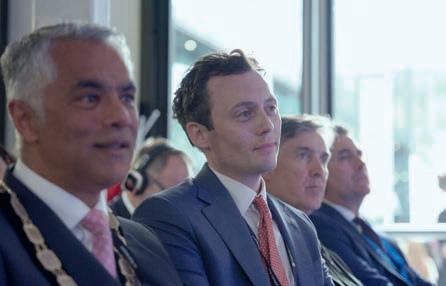



The winners of the 2025 NI Chamber Awards were honoured recently at a celebratory breakfast, hosted in partnership with Deloitte.
Speaking at the celebration, NI Chamber President Kailash Chada praised the quality and breadth of this year’s entries saying:
“This morning is about celebration; recognising the innovation, resilience and ambition that make Northern Ireland’s business community so exceptional. Each of you has achieved something remarkable, and together, you showcase the very best of our region.”
Kailash highlighted the strength across all categories, from Digital Revolution businesses transforming how we live and work, to Green Innovation leaders proving that environmental responsibility and commercial success can go hand in hand.


“Together, you are shaping a Northern Ireland that is confident, connected and forward-looking,” he said.
Winners and highly commended entrants were presented with their awards by the president along with Aisléan Nicholson, tax partner at Deloitte and Suzanne Wylie, chief executive at NI Chamber. Each category winner was nominated to represent Northern Ireland in the British Chambers of Commerce Awards.
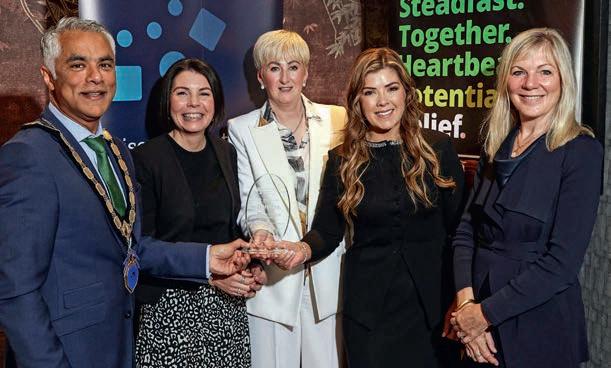






1. Green Innovation Business of the Year NatWest Cushon. 2. Local Economy of the Future Solmatix Renewables. 3. People & Work Business of the Year S&W Wholesale.
4. Digital Revolution Business of the Year Foods Connected (Highly Commended).
5. Green Innovation Business of the Year Game of Thrones Studio Tour (Highly Commended).
6. Local Economy of the Future Vision Fabrications (Highly Commended).
7. People and Work Business of the Year Cleaver Fulton Rankin (Highly Commended).
NI Chamber, Catalyst and Software NI played host to a two-day AI conference, delivered by MIT’s Paul Cheek. Designed to transform how Northern Ireland’s businesses, public sector and startups deploy AI, it incorporated a series of sector-specific, hands-on sessions on proven frameworks used by MIT startups and Fortune 500 companies to drive revenue growth, improve public services and accelerate business transformation.
Encouraging leaders to embrace the opportunity to learn from a global exemplar, Suzanne Wylie, Chief Executive, NI Chamber, said: “AI is no longer a future trend – it’s a current reality which is rapidly shaping how we deliver services, drive innovation, boost competitiveness and rethink our business models. Having Paul Cheek from MIT share his expertise is a unique opportunity for both business and public sector leaders to understand not just the technology and its capabilities, but how to practically use the tools and seize the opportunities.”
The two-day agenda included a half-day session for established businesses, a focused session for public sector leaders responsible for the digital transformation of public services and a hands-on workshop for startups. It also incorporated roundtables for senior leaders in both Belfast and Derry, where attendees were challenged to assess how AI can be leveraged to drive productivity, enhance innovation and create high-value jobs.
Crossing the AI Frontier was delivered with the support of headline sponsor AWS, along with session sponsors Ergo, Slalom, EY and Microsoft. It is also delivered in partnership with Invest NI, Department for the Economy and Matrix.






1. Early-stage businesses at a workshop.
2. Professor Helen McCarthy chaired a public sector panel discussion.
3. Start-ups learned to validate ideas, prototype solutions, and go to market faster.
4. Gareth Kelly (EY); Mel Courtney (Catagen); Judith Savage (EY) and Tim Cush (EY).
5. FPaul Cheek delivered a series of interactive sessions inside the MAC.
6. Steve Orr (Catalyst); James Applegate (US Consul General); Jon Boucher (Chief Constable); Caitroina McCusker (PwC); John Walsh (Belfast City Council) and Sir David Sterling.




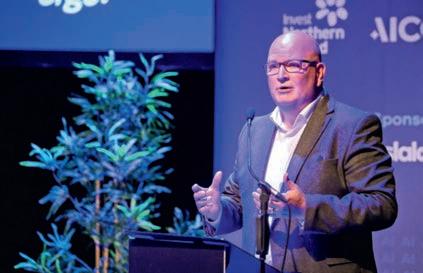
7. The organising partners from NI Chamber, Catalyst and Software NI with sponsor representatives from AWS, EY and Microsoft.
8. A dinner for senior leaders was sponsored by EY.
9. An interactive session encouraged attendees to experiment.
10. Dave Vincent from headline sponsor AWS.
11. Delegates got to work with practical exercises.
12. Founders worked through the process of building an AIDE from scratch.


Paul Cheek MIT Entrepreneur in Residence
Northern Ireland’s business base is rightly proud of its resilience and ingenuity. The next competitive edge will come from a new kind of firm: the AIdriven enterprise (AIDE). An AIDE is a business that puts artificial intelligence at the core of how it researches markets, designs products, serves customers, and runs operations. Think of it as the innovative ambition of a startup – with the lean e ciency of a well-run SME.
Why does this matter for NI?
Because AIDEs change the arithmetic of compound growth. They help new companies move from idea to revenue far faster, with far fewer people and less capital. The same is true of existing businesses as they grow beyond serving local markets to export to other regions. That is exactly the formula regions like NI can use to compete globally while creating higher-value jobs locally.
Most firms here recognise themselves somewhere on the SME–IDE spectrum. SMEs are close to customers and cash-conscious; IDEs chase global markets with novel tech and often need significant funding. AIDEs blend the best of both: global ambition, but with AI-enabled efficiency. In practice, that
looks like:
• Faster product cycles. Generative AI shortens “innovation/product development debt” – the expensive gap between an idea and a marketready product. Weeks, not years.
• Lean teams, bigger outcomes. AI agents automate routine work in support, marketing, finance, and QA. Revenue per employee rises; hiring focuses on the truly critical roles.
• Earlier revenue, optional capital. When small teams can win paying customers quickly, they can fund growth from sales – or raise less, on better terms.
For founders and leaders, this reframes the core question from “How fast can we hire?” to “How efficiently can we automate and learn?”
AIDEs reduce the historic advantages of deep local capital pools and massive headcount. That levels the playing field for places like Northern Ireland, where talent is strong and budgets are disciplined. Three regional dividends stand out:
1. Export intensity from day one. AI-enabled go-to-market (multilingual
support, automated marketing, programmatic sales) lets small NI teams serve customers globally without building large overseas operations first.
2. Higher productivity, better wages. As firms replace lower-value tasks with AI, they can upskill and redeploy people into higher-skill roles – improving margins and the quality of local jobs.
3. Broader startup base. If it takes less capital to validate ideas, more entrepreneurs can start – diversifying the pipeline instead of waiting for a few big bets.
1. Run an “AI to revenue” pilot. Pick one product, service, or process with measurable value. Combine a founder/GM, a technical lead, and an operator. Use generative AI to build or improve the offer; use AI agents to automate lead gen, onboarding, and support. Define a single success metric (e.g., time to first sale, cost per qualified lead, or net revenue per employee).
2. Build an AI operating layer, not just point tools.
Map your end-to-end workflow – from discovery to renewal – and insert AI where it removes bottlenecks (research,

prototyping, documentation, testing, quoting, invoicing). Treat this like a lightweight “process transformation,” not a one-off experiment.
3. Hire for leverage.
Prioritise “multipliers”: product thinkers, full-stack builders comfortable with AI, and commercially minded operators who can design data-driven experiments. Make proficiency with AI tools a baseline skill, not a specialist niche.
4. Measure what matters.
Track revenue per employee, time to ship, cycle time from customer insight to product change, and the share of tickets/tasks resolved by AI. Celebrate fewer manual steps and faster learning, not larger teams.
• Manufacturing & advanced engineering: AI-assisted design, faster quoting, predictive maintenance, and automated quality control – from the shop floor to the sales desk.
• Agri-food: Demand forecasting, yield modeling, automated compliance, and direct-to-consumer personalisation at SME budgets.
• Digital & creative: Rapid prototyping of apps and content, AI-native customer support, and programmatic internationalisation.
• Professional services: Productising expertise with AI copilots, turning billable hours into subscription revenue.
The common thread is clockspeed – how fast customer learning loops through your whole business. AIDEs increase clockspeed dramatically, allowing NI firms to out-iterate larger rivals.
• Practical capability building. Short, hands-on sprints that help teams ship an AI-enabled feature or workflow –not just attend a seminar.

• Credits and sandboxes. Low-friction access to cloud/AI platforms so SMEs can test and learn without heavy upfront spend.
• Smart procurement. Public and corporate buyers can pilot local AIDEs, creating the early reference customers that unlock export growth.
• Talent development. Align universities, colleges, and employers around “AI fluency” as a core employability skill across disciplines.
AIDEs are not about replacing people; they are about amplifying the people Northern Ireland already has – accelerating innovation, boosting productivity, and opening global markets from here. If you’re an NI business leader, the question is no longer whether to adopt AI at the core of your enterprise, but where to start this quarter. Begin small, learn fast, and let the results compound.
In early November, NI Chamber hosted its annual Meet the Buyer; an event designed to connect buyers with significant procurement needs to suppliers in the local market. It is one of NI Chamber’s flagship business development initiatives, aimed at strengthening local supply chains and helping member companies to identify new commercial opportunities. Delivered in partnership with Bank of Ireland, this year’s event facilitated more than 250 one-to-one meetings.
Among the buyers attending were representatives from Belfast International Airport, which is currently undertaking a £100m fiveyear investment programme. Other large organisations searching for new suppliers included Heathrow, Navantia UK, Translink, Belfast City Council, SONI, Hastings Hotels, Choice Housing, NI Water, NIE Networks, AG Building and Paving, Tobermore and Ryobi. On the day, each held a series of facilitated meetings with local firms providing everything from electrical and facilities maintenance, to office and IT equipment, marketing and professional services.
Meet the Buyer with Bank of Ireland was also delivered with the support of NI Chamber’s SME Partner, Power NI.








6.

While businesses in Northern Ireland remain resilient, firms continue to face sustained cost pressures, particularly from wages and taxation. A Quarterly Business Insights Report published by NI Chamber and Queen’s University illustrates that while overall sentiment remains cautiously positive, confidence has moderated since early 2025. Many businesses are maintaining operations and employment despite tightening margins and weaker cashflow.
Business conditions in Northern Ireland weakened somewhat in Q3 2025, with more firms reporting increasing strain. Just over half (52%) of businesses say activity or demand has weakened compared with three months ago, while nearly a quarter (24%) are now under clear financial pressure, the highest proportion since early 2023.
Although the share of firms trading well has edged up to 37%, more are now just covering costs or struggling to break even (24%), suggesting that while overall trading levels remain steady, the underlying financial resilience of some businesses is deteriorating.
Rising wages, tax, and input costs continue to squeeze margins, leaving limited capacity to absorb further increases or invest for growth. After signs of easing earlier in the year, the number of firms reporting weaker demand and tighter finances has ticked upward again, signalling a more cautious mood.
Business confidence remains positive but below pre-pandemic highs. Manufacturers show stronger turnover expectations (+53%) than services (+28%). Profitability confidence is also positive, though tight margins continue to weigh on sentiment.
Investment intentions remain stable. They are positive for manufacturing and marginally negative for services, signaling that firms are maintaining activity rather than expanding. Training investment is holding firm, especially in manufacturing, as businesses prioritise upskilling to address ongoing skills shortages.
Cashflow balances for both manufacturing (-2%) and services (-5%) remain weak and are both negative in Q3 2025. Despite some modest quarter-toquarter fluctuations, neither sector has managed to sustain a positive cashflow balance since 2022.
Price rise expectations have eased slightly across both the manufacturing and service sectors. Labour costs (+89% manufacturing, +87% services) continue to dominate internal pressures, followed
by raw materials and utilities. For both sectors, Northern Ireland ranks first across the UK regions in terms of the share of businesses citing labour costs as a key challenge.
Inflation (+66% manufacturing, +62% services) and business taxation (+51% manufacturing, +64% services) remain the top external concern cited.
Recruitment activity remains robust, with +80% of manufacturers and +69% of services firms attempting to recruit during Q3 2025. However, recruitment difficulties persist at high levels with 84% of manufacturers and 75% of services businesses reporting challenges finding suitable candidates.
The report highlights a structural mismatch between workforce capabilities and business needs in Northern Ireland –an issue which is constraining productivity and growth in the region.
Hard-to-fill vacancies remain a challenge for 78% of businesses, particularly for leadership and technically skilled roles. Firms also report shortages in sales, finance, digital, and operational areas, demonstrating that skill gaps affect both strategic and day-to-day functions.
Places for students from Northern Ireland in local universities are limited due to a financial control known as the Maximum Student Number (MaSN) cap. The survey indicates that awareness of that cap is low, with only around one in three survey respondents (36%) familiar with it.
Among those who are aware of the MaSN cap, 38% are taking action to address the deficit it creates, with 21% expanding apprenticeships or training and 15% relocating roles outside of Northern Ireland.
When asked, a majority (82%) of businesses surveyed said they support a renewed conversation between the UK government and the NI Executive on lowering Corporation Tax in Northern Ireland. Many see this as a lever to boost competitiveness and attract investment, with some referencing it in addition to Northern Ireland’s dual market access to the UK and EU.
However, firms stress that reform should be part of a broader competitiveness strategy which also includes investment in skills, R&D, and infrastructure. Respondents cited fiscal constraints and political uncertainty as key barriers to progress.
Commenting on the findings, Suzanne Wylie, Chief Executive NI Chamber, said: “The high cost of doing business
“Rising wages, tax, and input costs continue to squeeze margins, leaving limited capacity to absorb further increases or invest for growth.”
continues to create a cautious yet resilient business environment. And whilst in relative terms, it is encouraging to report that Northern Ireland has recently been outperforming the UK average across many indicators, business conditions have weakened somewhat this quarter, with ongoing pressure on operating margins and limited financial headroom available to many firms.
“Members are eager to see government follow through on commitments which will help boost growth and Northern Ireland’s competitive proposition. This is evidenced by the overwhelming majority who support the restarting of the conversation on corporation tax between the Executive and UK government. There is a clear desire to reduce costs, and create a new growth story underpinned by an ambitious long-term economic strategy.”
Professor Sir Ian Greer, President and Vice-Chancellor, Queen’s University Belfast, added:
“These findings underscore both the challenge and opportunity facing Northern Ireland’s economy. With businesses showing resilience, manufacturers expecting strong growth, and our region outperforming on exports, there’s clear demand for the skilled graduates we produce.
“A triple helix approach based on partnership between government, industries, and Further and Higher Education providers, which prioritises skills, R&D, and infrastructure investment, is the key starting point for sustained and sustainable inclusive economic growth in Northern Ireland. We need government, industry, and universities working together, aligning policy frameworks like the MaSN cap with economic need, deepening industry academic collaboration, and ensuring our talent pipeline matches the ambitions of businesses that are investing in training despite tight margins.
“This is our opportunity to demonstrate that strategic investment in higher education isn’t separate from economic recovery, it’s fundamental to it.”





























NI Chamber has called for ‘radical action’ on skills development in Northern Ireland, citing the need to accelerate the creation of a responsive system that meets the needs of a rapidly changing business environment.
Addressing more than 250 business leaders at the annual Workforce Summit Suzanne Wylie welcomed the publication of the Skills Action Plan by the Department for the Economy, whilst stressing that delivery at pace is now key.
“Delivering the skills Northern Ireland needs requires genuine partnership between industry, government, and education. Failure to do so would mean eroding Northern Ireland’s competitive advantage, leaving our workforce unprepared and our economy behind as the world accelerates into the AI-driven future,” she said.
“Our members face recurrent changes, exacerbated by a fragmented system, an ageing workforce and under-investment in training. But the scale of opportunity is significant. If we can seize the opportunity to create a skilled, healthy, and adaptable workforce that powers growth in the digital, green, and AI-driven economy, then our economic future will be much more secure.”
Turning to those solutions she said:
“Action on skills delivery requires the immediate implementation of mechanisms that enable businesses to upskill and reskill their workforce, remove barriers for employers to recruit and train apprentices, whilst also providing targeted support for those furthest from the labour market.
“Twelve months ago, NI Chamber called for the establishment of a Workforce Development Agency. Last week saw the approval of a motion proposing a Talent Development Agency at the Northern Ireland Assembly. This is a welcome first step – now it is time to get on and deliver this for our businesses and our workforce.
“At the same time, we have engaged extensively on the ‘Good Jobs’ Employment Rights Bill, where we are committed to an outcome that works for business and secures competitive advantage. While concerns persist, we recognise where progress has been made and welcome that the Minister has repeatedly committed to

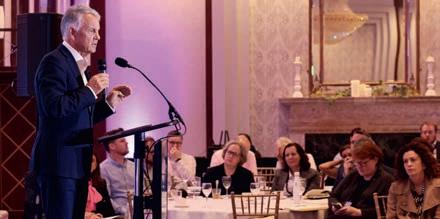


an outcome that works for employers and workers alike.”
Economy Minister Dr Caoimhe Archibald, who was in attendance to launch her Department’s Skills Action Plan to a gathered audience of business leaders, added:
“Our economy is changing rapidly, with new industries emerging and leading the way with innovative technologies, and this is driving the demand for more highlyskilled workers.
“This new Skills Action Plan, which has collaboration with business at its core, is a distinct, forward-looking framework that will deliver on the Economic Vision and the Programme for Government, through targeted actions that reflect current and future economic needs.”
Delegates at the Future Workforce Summit also heard from the Chair of Skills England Phil Smith and the Chair of Ireland’s National Skills Council Dr Kevin Marshall, as well as Gareth Hetherington, director of Ulster University’s Economic Policy Centre and Paul Gillen, a partner in the Employment, Immigration and Reward team at Lewis Silkin.
The event was delivered in partnership with headline sponsor NIE Networks and supporting sponsors EY, Further Education NI, and Work+.

1. Dr Caoimhe Archibald.
2. Gordon Parkes, Executive Director, NIE Networks.
3. Phil Smith, Chair of Skills England.
4. Economy Minister Caoimhe Arcibald with sponsor representatives from Workplus, Further Education NI. NIE Networks and EY.
5. Minister for the Economy Dr Caoimhe Archibald MLA.
6. Kevin Marshall, Chair of the National Skills Council in Ireland.
Addressing attendees, Gordon Parkes, executive director of People & Culture at NIE Networks, said:
“In this fast paced and constantly evolving landscape, we must act now to ensure that future workforces are equipped with the skills required to deliver climate and energy goals. We welcome the Green Skills Action Plan which was launched earlier this year and provides a comprehensive framework but it needs to be matched with energy and collaboration across all sectors. The Workforce Summit is an important event that brings the sectors together providing the opportunity for those vital connections to be made and encouraging that collaboration which is so vital if we are to deliver the workforce required for the future.”









Crack international markets. Stay updated on latest trade trends. Navigate compliance with confidence. Our expert-led online training programme equips you with the practical skills needed for international trade success.
3-hour focused sessions | 9:30am-12:30pm


















Who should join?
Business owners, managers, finance, and trade teams. Cost: Members £200+VAT | Non-members £300+VAT
Contact NI Chamber today: www.northernirelandchamber.com









Anew chapter has begun for Foodstock with the o cial opening of its Education and Empowerment Centre in Belfast – a space designed to give children and adults new opportunities to learn, grow and build confidence for the future.
The centre was officially opened by Carl Frampton, who praised the work being done to support families and give young people the encouragement they need to reach their potential. Speaking at the launch, he said the new facility “shows the best of what Belfast is about – people coming together to make a difference.”
Foodstock was founded by Paul Doherty during the pandemic, when many families were struggling to get by. What began as a foodbank run from a small garage quickly became a wider community effort – delivering food parcels, setting up breakfast clubs and offering practical support to anyone in need.
Over time, it became clear that meeting immediate needs was only part of the challenge. Many families wanted access to education, training and jobs – ways to move forward, not just get by. That idea led to the creation of the new Education and Empowerment Centre.
The centre offers free tuition for children, including help with transfer tests and core subjects, alongside adult learning and skills programmes. There are courses in digital literacy, employability and personal development, all delivered in a welcoming and community-based setting.
Paul Doherty said the aim is simple:
“We want children to walk through our doors and feel a sense of community all around them – and to leave here feeling inspired. Whether it’s a child gaining confidence in their schoolwork or an adult returning to learning after years away, this centre is here to help people take that next step.”
The opening event brought together teachers, volunteers, local employers and community partners who have all supported Foodstock’s journey. Many helped fit out the new classrooms, supply learning materials and design the first round of programmes.
Doherty described it as a “onecommunity effort” – with local people,

trades and businesses all contributing to bring the project to life. “It’s a real example of what can be achieved when everyone works together with a shared goal,” he said.
While the centre is now up and running, its ambitions are long term. Foodstock plans to grow its educational work city-wide, creating accredited training opportunities, linking with local employers and continuing to provide free support for those who need it most. The organisation also hopes to pilot new youth leadership and mentoring programmes in the coming year.
For Doherty, this project is part of a wider vision: tackling the causes of poverty and inequality through education and opportunity. “We’ve seen the difference that practical support can make to families in crisis,” he said. “Now, we want to help people move beyond that – to build skills, confidence and independence. This centre is about giving people the tools to do just that.”
For those attending the launch, there was a clear sense that the new centre isn’t just about classes or qualifications –it’s about community. It’s a place where children and adults can find support, encouragement and a reminder that they are not on their own.
As Carl Frampton cut the ribbon, he summed it up simply:
“This centre gives people a chance – and sometimes, that’s all anyone needs.”
Closing the event, Ciaran Toman, chair of Foodstock, highlighted the role of local support:
“This hub was built because local businesses, traders and professionals stepped up, rolled up their sleeves and stood with us. Their support has been incredible – a real example of what can happen when our business community works together for the common good.”
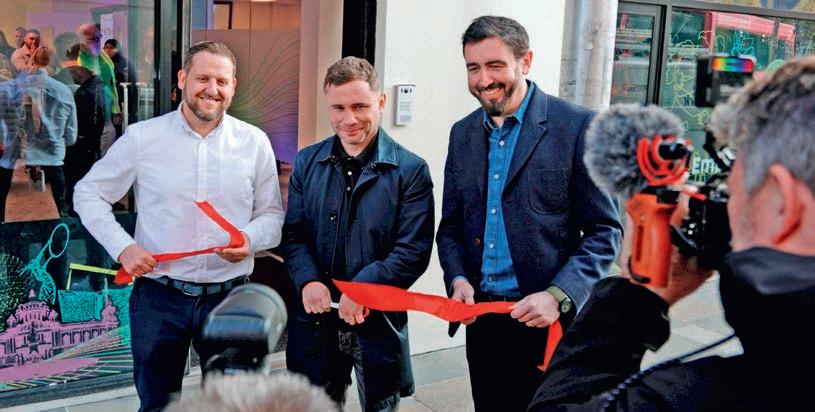
If 2025 is to be remembered as a turning point, then words alone will not be enough.

Businesses, policymakers, and retailers must move beyond the rhetoric and take decisive action to support sustainable packaging manufacturers and strengthen manufacturing as a whole.
The stakes are high.
Rising energy costs, uneven regional policies, and complex regulatory frameworks are creating an environment where ambition or targets alone are not enough.
Encirc, part of the Vidrala group, is a market leader in glass container design, manufacturing, and bottling across three sites in the UK, providing around 2,000 skilled jobs across three sites in Fermanagh, Cheshire, and Bristol.
Manufacturers like Encirc are facing a dual challenge: driving innovation and sustainability while competing against imports from regions with fewer financial and regulatory burdens.
Without practical, targeted support and a tax system that truly incentivises sustainable practices, the UK risks falling behind in the global race for responsible manufacturing.
Encirc recently hosted UK Secretary of State for Business and Trade, Peter Kyle, at its Cheshire facility at the end of October, where a landmark intervention was unveiled to cut electricity network charging for energy-intensive industries, an exciting step forward for manufacturing.
However, the cut in electricity charging does not apply to Northern Ireland prompting calls from major industries here for a level playing field on energy pricing.
Another challenge is the newly introduced Extended Producer Responsibility (EPR) which came into effect last month.
The scheme aims to encourage higher recycling rates by shifting recycling costs to the companies that put packaging on the market.
EPR fees are calculated primarily on weight, not recyclability or environmental benefit. Glass, being heavier than alternatives like plastic or aluminium, incurs disproportionately high costs, despite being infinitely recyclable and chemically inert.
This creates a market distortion, driving brands and consumers towards less sustainable short term choices, at odds with government policy and where we need to get to for the future.
Everyone accepts that continued government support for vital industries like glass manufacturing is essential to safeguarding jobs and unlocking investment across all regions.
But that support needs to be matched by a tax system that achieves what it sets out to do.
So, as we look ahead, the momentum behind sustainable packaging must translate into tangible action.





As Northern Ireland’s commercial property market continues to evolve, few firms are better placed to navigate its complexity than CBRE NI. Operating as part of the CBRE a liate network, CBRE NI combines local knowledge with global expertise to deliver a truly full-service property o ering.
While CBRE NI’s agency and investment teams are well known, its specialist professional services
departments are equally integral to client success.
“CBRE NI is uniquely positioned in the market,” explains Mark Elliott, senior director, Valuation & Professional Services. “We bring the weight and reach of the global CBRE network, but we’re also firmly rooted in the local landscape. That combination allows us to deliver an exceptional level of research, insight, service, and value for clients right across Northern Ireland.”

TRUSTED VALUATION EXPERTISE ACROSS EVERY SECTOR
At the heart of CBRE NI’s offering is its comprehensive valuation service, a discipline that underpins many of the region’s largest property and finance transactions. The team provides valuations across the office, retail, industrial, commercial development land, residential development land, and agricultural sectors.
“We support all major lenders in
Northern Ireland with secured lending valuations,” notes Steven Conwell, director, Valuation & Professional Services. “But our work goes far beyond that. We also provide valuations for accounts purposes to some of the region’s leading businesses, ensuring transparency, compliance, and confidence in their property portfolios.”
CBRE NI’s capabilities extend well beyond the traditional. Specialist valuations cover care homes, licensed premises, and social housing, while the firm can also call on CBRE’s wider UK and global network to assess more complex asset types, including hotels, outlet stores, hospitals, student accommodation, and even football stadiums.
“It’s about giving clients access to specialist expertise wherever their assets are, whether that’s a retail park in Armagh or a hotel in Belfast,” Steven adds.
CBRE NI’s Building Consultancy team provides the technical rigour and strategic insight clients need throughout the property lifecycle, from acquisition and due diligence to fitout, refurbishment, and ongoing asset management.
“Our job is to protect and enhance value at every stage,” says Stuart Magill, director, Project Management & Building Consultancy. “We combine technical knowledge with commercial understanding, so our advice is not only accurate but actionable.”
Key services include technical due diligence, dilapidations, reinstatement cost assessments, and project and cost management.
One of the team’s standout projects was the Cat-B fit-out of Lloyds Banking Group’s new 30,000 sq ft headquarters at The Paper Exchange in Belfast.
“Lloyds wanted a flexible, sustainable, and people-focused workplace,” explains Stuart. “We managed the entire project from day one, delivering spaces that support collaboration, wellbeing, and innovation – from a working café and broadcasting studio to biodiversity features including a rooftop bug hotel. It’s a fantastic example of how great design and technical delivery can work hand-in-hand.”
REDEFINING OPERATIONAL EXCELLENCE
Another area in which CBRE NI is setting
“Lloyds wanted a flexible, sustainable, and people-focused workplace,” explains Stuart.
new standards is Facilities Management (FM) and Health, Safety, Environment & Quality (HSEQ) services. The firm’s integrated model is built around its ‘People, Place & Process’ philosophy, which ensures that every client receives tailored, compliant, and sustainable solutions.
“Our FM approach is completely client-centric,” says Brendan Dorrian, associate director, HSEQ Compliance.
“We co-ordinate everything from planned maintenance and cleaning to risk assessments, fire safety, and sustainability reporting through a streamlined solution.”
Through its Vantify Risk Manager system, CBRE NI provides real-time visibility across client portfolios. “It’s a digital-first compliance platform that supports risk identification and evaluation, incident reporting and investigation, compliance and reporting, permit management, and supplier accreditation in a single area,” Brendan explains. “That transparency gives our clients total confidence in their compliance status.”
The firm’s partnership with DailyPay, a New York-based fintech that recently established its first international base in Belfast, illustrates this approach in action.
“When DailyPay set up its Northern Ireland headquarters, they needed a partner who could manage both FM and health and safety as they scaled,” says Brendan. “We provide overarching support, delivering an efficient, compliant, and productivity-focused workplace environment that’s ready for growth.”
SUSTAINABILITY LEADERSHIP
Sustainability is woven throughout CBRE NI’s service lines. The team supports clients in achieving carbon reduction, waste management, and lifecycle planning goals, helping them align with ESG benchmarks and regulatory requirements.
“ESG isn’t an add-on for us,” adds Brendan. “It’s embedded in everything we do. Whether we’re advising on building performance, facilities management, or development planning, we’re helping
clients make responsible, data-driven decisions that create long-term value.”
CBRE NI’s Lease Consultancy and Business Rates teams play a vital role in helping clients manage, negotiate, and optimise their property interests. Services range from rent reviews, lease renewals, and restructures to strategic estate reviews and rating appeals.
“Lease events and business rates reviews are key opportunities to drive value,” explains Mark Elliott, senior director, Valuation & Professional Services. “We work closely with landlords, tenants, and occupiers to identify savings, mitigate risk, and uncover new commercial opportunities.”
CBRE NI is currently instructed on a high number of estate reviews, which covers off existing commercial agreements, opportunities for growth, and advice in relation to the forthcoming Business Rates Revaluation 2026.
“These reviews give clients a complete picture of their portfolio’s performance,” Mark adds. “It’s about proactive management, not just reacting to market changes but planning for them.”
CBRE NI delivers a joined-up service model that supports every stage of the real estate journey. It is this integration, backed by a global network and powered by local expertise, that continues to set the firm apart.
“Whether we’re helping an international business establish its Northern Ireland base or advising a local company on its next property move, our focus is always the same,” Mark concludes. “We aim to be a trusted partner for our clients, providing the insight, innovation, and service that helps them succeed.”
Amid Northern Ireland’s evolving commercial property market, CBRE NI stands ready to guide its clients through whatever comes next – combining experience, technology, and a passion for excellence to shape the workplaces, developments, and communities of the future.
Titanic Quarter and Belfast Harbour are proud to announce that together they have raised an impressive £5,159 for Northern Ireland Hospice, following a series of staffled fundraising activities throughout September.
The fundraising efforts included a Coffee Morning, a Charity Car Wash, and culminated in the team (Hull Yeah!) taking part in the Northern Ireland Hospice Dragon Boat Race on the River Lagan on Friday 12 September.
Despite the unpredictable Northern Irish weather forcing a location change, the Coffee Morning – originally planned for the City Quay Gardens – was warmly hosted in the beautiful surroundings of the Belfast Harbour Commissioners Office. Employees from Belfast Harbour’s Clarendon Offices and neighbouring businesses came together to enjoy refreshments and contribute generously to the cause.
Titanic Quarter and Belfast Harbour are proud to announce that together they have raised an impressive £5,159 for Northern Ireland Hospice, following a series of staffled fundraising activities throughout September.

The fundraising efforts included a Coffee Morning, a Charity Car Wash, and culminated in the team (Hull Yeah!) taking part in the Northern Ireland Hospice Dragon Boat Race on the River Lagan on Friday 12 September.
Despite the unpredictable Northern Irish weather forcing a location change, the Coffee Morning – originally planned for the City Quay Gardens – was warmly hosted in the beautiful surroundings of the Belfast Harbour Commissioners Office. Employees from Belfast Harbour’s Clarendon Offices and neighbouring businesses came together to enjoy refreshments and contribute generously to the cause.

Special recognition goes to Shona Anderton for coordinating and driving all Titanic Quarter fundraising efforts throughout the month.
The £5,159 raised will make a meaningful and measurable difference to the work of Northern Ireland Hospice, which could help to fund:
• Five nights of specialist care in the Adult In-Patient Unit, providing comfort, dignity, and round-the-clock support for people living with lifelimiting illnesses
• A full month of Hospice at Home care, offering 27 hours of compassionate, professional support each week to an adult or child in the comfort and familiarity of their own home
• A full year of bereavement support for six families, helping them navigate loss with guidance, space, and hope during the most difficult of times.
Speaking on behalf of Titanic Quarter, Shona Anderton, PA to Chief Executive said:
“We are incredibly proud of the generosity and enthusiasm shown throughout this year’s fundraising efforts. Supporting Northern Ireland Hospice is a cause close to the hearts of

many, and these funds will go directly toward helping local families when they need it most. Thank you to everyone who contributed, volunteered, or participated.”
Titanic Quarter extends sincere thanks to its staff, neighbours, partner organisations, and all who supported the events throughout August and September. Together, these efforts demonstrate the strength of community and the positive impact that corporate collaboration can achieve.






When consumers are struggling to pay for their energy, many wait too long before seeking help. Sinéad Dynan, head of Consumer and Business Protection at the Utility Regulator, says that’s exactly the pattern she wants to break through two new Charters launched for this winter.
The Utility Regulator’s drive to open up conversations between consumers and energy suppliers is one of the key messages coming from the fourth Domestic Consumer Energy Charter and the second Small Business Energy Charter which were published recently. Both Charters are voluntary agreements between Northern Ireland’s energy suppliers and the Utility Regulator to provide extra support for households and small businesses during the winter months.
“Early engagement is so important. We know that both domestic and non-domestic consumers can put off getting in touch, but the earlier you do, the better the outcome. We are aware from research by Advice NI that it can take up to two years for some people to reach out about debt, yet the relief they feel when support finally comes is huge. Prevention really is better than cure,” begins Sinéad Dynan, head of Consumer and Business Protection at the Utility Regulator.
Northern Ireland’s Consumer Energy Charters for Winter 2025/26 were launched on 1 November 2025. The initiative, now in its fourth year for households and its second for small businesses, is led by the Utility Regulator in partnership with gas and electricity suppliers, the Consumer Council, the Department for the Economy, the Department for Communities, Advice NI and Make the Call. It’s a collaboration that has the strength and reach to support those struggling with energy bills when most needed.
The Domestic Consumer Energy Charter was first introduced back in 2022. “During Covid, and then as the cost-of-living crisis hit, people were really struggling,” Sinéad explains. “There were already processes in place through regulation, but we wanted to do something at pace that would help people during those difficult winter months when energy use is highest.
“It was voluntary. We worked with suppliers, the Consumer Council and the departments. Everyone pulled together to
get some relief out to customers quickly.”
That collaboration produced tangible results. In the domestic market, the first Charter introduced practical protections such as contributions to hardship funds, enhanced protections for consumers in debt and commitments to enhance communications. “Those supports worked well and got good feedback. Organisations told us they were having much better interactions with suppliers. So, based on that, we looked at doing one for small businesses.”
Launched last year, the Small Business Energy Charter set out eight core commitments for gas and electricity suppliers. These include proactive engagement with businesses in arrears, encouraging and empathetic communication, practical energyefficiency advice, and the creation of a specialised contact point within each supplier for advice bodies and the Utility Regulator itself.
“This year, we’ve added two new commitments. Suppliers are developing an accessible FAQ section on their websites for small business customers and are committing to training staff to understand the specific challenges small firms face. That’s all about enhancing the relationship,” Sinéad continues.
One of the biggest insights to emerge, she adds, is that many small companies don’t realise they can have a relationship with their supplier. “A lot of businesses didn’t think of their supplier as someone they could go to for help or advice. They didn’t know that, if they were struggling, they could look at usage, discuss payment options or even switch to get a better outcome. The Charters are helping to change that mindset.”
Asked how the Utility Regulator defines its role, Sinéad explains: “We want suppliers and consumers to build good relationships directly. That’s good for everyone.
“We have the benefit of strong communication channels, so part of our job is to get information out there, letting people know what support exists, that there’s help, that you can switch and find better deals.”
The Utility Regulator’s Consumer Protection Programme (2024–2029) reinforces this work. While the Charters are voluntary, they complement formal regulatory powers that allow the Utility Regulator to build a regulatory framework around consumer protection and use its enforcement powers to investigate any contraventions.
“We want suppliers and consumers to build good relationships directly. That’s good for everyone.”
Four years in, the domestic framework “is where we need it to be,” Sinéad says, “so it’s now about promoting it and reminding people of the breadth of support that’s available all year round.”
For small businesses, the evolution continues. “At the end of each winter we sit down with suppliers and the support organisations to ask what went well and what we should look at for next year. It’s a continuous improvement process.”
Among the most significant changes for 2025/26 is the emphasis on information and knowledge-sharing. “There are so many options. We’re increasing awareness through FAQs and enhancing staff training. The Consumer Council’s website also plays a big role in showing people how to switch, and that’s vital for helping them get a better deal.”
Although participation is voluntary, the response has been universal. “All electricity and gas suppliers have signed up,” Sinéad confirms. “In the domestic market all seven suppliers have signed up; in non-domestic all eight have signed up. They all see the value.
“Suppliers already do a lot of good work and this helps promote that good work. It’s beneficial across the board: it helps handle debt, it helps reputation and it’s good business. No one wants customers in debt; it’s not efficient. The Charters help everyone work together to find manageable payment plans.”
Referencing her earlier message, she reiterates the need for those struggling to pay bills to talk early. “Opening the conversation helps with affordability. Don’t put your head in the sand.
“We also want to promote transparency too. Check your contract, understand your
terms and when renewal time comes, look around to see if there’s a better deal. The Consumer Council has a switching tool that’s really popular, and we’re supporting that.”
Linked to the Charters is the Utility Regulator’s ‘Improving the Non-domestic Consumer Experience’ project, which will bring new licence conditions into effect from February 2026. These will require suppliers to publish transparent pricing information for small business consumers and to clarify how and when security deposits will be returned. “It’s about not just protecting, but enabling,” Sinéad says.
The latest Non-domestic Consumer Insight Tracker Survey found that while concern about energy bills has fallen from 53 to 30%, almost a third of firms remain anxious. A new qualitative study is underway “to engage directly with businesses that have struggled with or are worried about energy costs to learn from their experiences and translate those insights into practical actions and better outcomes.”
That work extends to sectors that blur the domestic and non-domestic lines, like farmers. Findings are due to be published late spring.
For Sinéad, the Charters and the effort put in by the Utility Regulator and its collaborators is a good news story. “What can bring real respite is simply knowing that help is there, especially when you’re struggling.”
Looking further ahead, the Utility Regulator is turning its attention to broader questions of transparency.
“We’re currently consulting on third-party intermediaries, private companies that act between suppliers and consumers. We want to ensure that businesses engaging with third-party intermediaries are adequately informed and protected.”
Next year will also mark the third year of the Consumer Protection Programme, with a series of new projects planned.
“One we’re really excited about is our Energy Literacy Project. We’re mapping the consumer journey from receiving a bill to leaving a supplier, looking at all the touch points with industry and how to improve them. We’ve done this work with domestic consumers already, and it could evolve into something similar for the nondomestic market.
“We want this to work for everyone, right across the piece. A lot of what we do through the Charters makes a real difference,” she says.
A familiar face on Lisburn’s high street has taken a major step forward after more than three decades in the shoe repair trade.
Denvir McShane, a well-known local cobbler, has acquired the premises and goodwill of Prestige Shoe Repairs, the long-established business where he first began his career as an apprentice 34 years ago.
Supported by Ulster Bank, the acquisition marks a proud milestone for McShane who is helping to secure the future of a traditional craft.
“I’ve spent my whole working life here, learning the trade,” he said.
“It was just a few months after leaving school that Charlie Rice, the original owner, took me under his wing and showed me the ropes. In the 34 years that have passed since I’m really proud to have served generations of customers in the area. To now own the business and continue this craft, in this community, is very special to me.”

Prestige Shoe Repairs has been part of the local retail landscape for over 50 years, providing shoe repair services and, in more recent years, key cutting.
Ulster Bank business development manager Paul Reid said: “Traditional trades are a very important part of our local economy. Denvir’s passion for his work, his experience, and his skill in this craft make him the kind of entrepreneur we’re proud to support.”
The need to be more circular has given rise to conscious consumers whose purchasing decisions are increasingly mindful


of their social, environmental, and ethical impact. This is where traditional businesses like Prestige Shoe Repairs can really find their footing in today’s market, as Denvir explains.
“Fast fashion has made it easy to replace rather than repair, but with the proper care a good pair of genuine leather shoes can last a lifetime. Even trainers can be repaired, which many people don’t realise. It saves money and reduces waste. For a very traditional business, I’d say that’s a legacy that stands toeto-toe with any modern business.”
For more information about Ulster Bank business banking, visit www.ulsterbank.co.uk.





As Belfast Harbour releases its draft 2050 Masterplan for public consultation this month, CEO Joe O’Neill looks at what the ambitious plans it outlines will mean for the city and the region.
From its very beginnings nearly two centuries ago, ambition and progress have been at the heart of Belfast Harbour’s growth into the confident, forward-thinking Trust Port that serves our city and Northern Ireland today.
In that time, we have moved from bustling quaysides welcoming wooden sailing ships to a thriving modern port, handling 70% of NI’s seaborne trade and a quarter of all island-wide trade, with £26.7 billion worth of goods moving through Belfast Harbour every year.
This trade enables just under 16% of NI’s total economic output, delivering

£8.8 billion in GVA and supporting more than 150,000 jobs. It is with this success in mind that we approach the next quarter of a century, as set out in our draft Masterplan 2050. We are setting ourselves a task of delivering even more for the economy, society and environment while carefully balancing the needs of our port users and estate tenants into the future. For it is our shared success that is our strength, and the bedrock of our ambition to build a stronger port for generations to come. What we set out to achieve in this Masterplan is also based upon a solid track record of growth and delivery.
In recent years, we have delivered an impressive array of projects, from the £275 million City Quays regeneration –including plans for further expansion – to the development of the D1 offshore wind terminal, and becoming the busiest cruise port on the island and the second busiest in the UK.
With the extension of Stormont Wharf we have created Ireland’s longest deepwater berth, and have led the way in sustainable logistics with the island’s first BREEAM Excellent warehouse.
More recently, we broke ground on our new D3 deepwater berth, the landmark £90 million project at the centre of our
2025-29 Strategy ‘Advance Regional Prosperity’, which itself will inform the first of three ‘Horizons’ around which the Masterplan is structured.
While Horizon 1’s projects are already underway or committed to financially through our own retained profits, Horizons 2 and 3 will look at longer-term needs, from how we best optimise existing land to options for reclamation, and replacing and upgrading ageing infrastructure and equipment, while keeping a strong focus on preparing for new technologies to improve efficiency and support our net zero goals.
Our connection to the city is also a key consideration, as we seek to continue to create and develop new neighbourhoods and communities where people are proud to live and work.
None of this is going to be possible without the support of those who have a stake in Belfast Harbour, and for whom this Masterplan is being developed – from our customers and tenants to the very people who live and work here. Over the past year and a half we have engaged with stakeholders across key areas, from port service providers and tenants to businesses and economic groups, as well as elected representatives and policymakers.
The feedback we have had so far has been invaluable in helping us to shape this draft, offering key insights into what matters most to our partners and customers. These include our need for sustained ongoing investment in infrastructure; developing our logistics capacity and the need for more highquality warehousing and distribution space; and ensuring that we remain efficient and competitive – all within the overarching framework of greater sustainability.
We have examined forecasts for port trade and real estate development, among other key areas, to ensure that
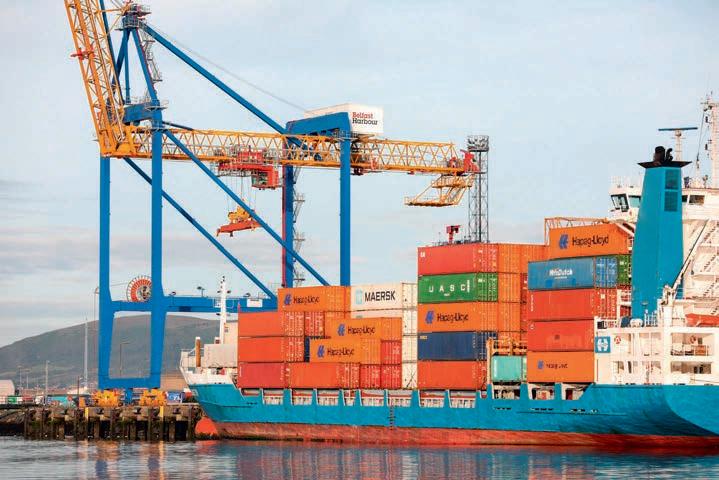
we are as clear as we can be on the opportunities and challenges which may lie ahead. We have also developed this document in line with guidance from the Department for Infrastructure and Department for Transport (UK).
We now turn our focus towards our public consultation, from which we will further shape the final Masterplan which will be launched in May 2026.
Starting this month, and running until mid-January, we are holding a series of temporary drop-in events at venues around the city, supported by a display at Harbour Office, as well as a dedicated webpage where the public can access our draft Masterplan and provide feedback on its contents.
This Masterplan is many things, but what it is not is a planning application. Rather, it reflects the longer-term vision and aspirations of our Board and the Belfast Harbour Commissioners for the port and estate and how we will help support the city and region in the decades to come.
Nor are we required in any statutory sense to consult on this Masterplan; it is our own decision to do so, in keeping
with our status as a Trust Port which is committed to conducting business in an open and responsible manner.
A lot can change within a quarter of a century, as recent global events have shown all too clearly. It is for that very reason that we are building flexibility into our plan, enabling us to adapt and pivot not only to our customers’ needs, but also to changes in regulation, markets and technology – economic, environmental and social alike.
Such inherent unpredictability also makes it even more important that we keep our core organisational values –People-focused, Open, Responsible and Trustworthy – close to us as we formulate and finalise this Masterplan. Throughout everything we do, these values – along with our Trust Port status – are our ‘North Star’, shaping the way we act and keeping us on the right bearing as we travel towards our horizons.
Details of the public consultation on the Draft Masterplan 2050 – including public engagement events – are available by visiting www.belfast-harbour.co.uk/ masterplan from 19 November onwards.

























A data breach can cost more than money; it can cost your reputation, your customers’ trust, and your peace of mind. With Restore Datashred, you can be confident that your confidential documents are handled with the utmost care and destroyed securely, in compliance with the highest industry standards. Our trusted team provides reliable shredding services across Northern Ireland.
Why choose Restore Datashred for secure document disposal?
We offer a range of secure shredding and destruction services including:


Convenience: We provide flexible scheduling and collection options to fit your busy schedule.


Compliance: We help you comply with data protection and environmental regulations, such as GDPR and the Environmental Protection Act 1990.





Sustainability: We are committed to recycling and responsible disposal, helping to reduce your environmental impact.


Peace of mind: With Restore Datashred, you can be confident that your disposal and recycling requirements are taken care of.
Leading the way in secure, compliant shredding services for your business
Restore Datashred is fully accredited to the highest industry standards, including ISO 9001, ISO 14001, ISO 27001 and BS EN 15713
As proud members of the BSIA, we give our customers complete confidence that confidential waste is destroyed securely, responsibly and in full compliance.


Area Sales Manager: Richard F. Jones Mobile: 07753 300 676 Email: richard.jones@restore.co.uk


By Blaithin Surgeoner
Blaithin Surgeoner, a Chartered Accountant withover30 yearsexperience and Partner at Endeavour InformationSolutions,a MicrosoftSolutions Partnerbased in Belfast, thatspecialisesin bringing optimising customers systems withMicrosoft Cloud solutions using a CloudFirst approach
Too often, accounting systems are viewed narrowly as tools to manage ledgers, process
But in today’s fast-moving landscape, growing businesses need more than just bookkeeping. They need agility in order toreactto change, integration with an organisation’s other systems and processes, and intelligent management reporting. That’s where Microsoft Dynamics365Business Central shines: a modern, cloud-based ERP solution that empowers businesses to go beyond accounting — and take control of their entire operation.
AFully IntegratedBusiness Platform:
Designed for small and medium-sized management with operations, sales, service, inventory, and projects. Thisseamless integration eliminates data silos and manual entry, providing one source of truth across the business.
From the moment a saleslead enters the system to when an invoice is paid and stock is replenished; BusinessCentral keeps teams connected and processesstreamlined
Built-in dashboards and real-time reporting departments, allowing for proactive, not reactive decision-making.

Feature-Rich Capabilities for Modern Businesses: BusinessCentral comesloaded with intelligent features that extend far beyond the capabilities of traditional accounting software:
• FinancialManagement: Robust nominal ledger, multi-currency support, dimensional reporting, bank reconciliation, in one place.
• Customer RelationshipManagement: Track customer interactions, automate sales processes, manage pricing and discounts, and convert quotes to orders seamlessly
• Inventory& SupplyChain: Gain full visibility into inventory levels, suppliers, warehouses, and product movements. Automate reordering and optimise stock to reduce costs and improve delivery times.
• ProjectManagement: Monitor resources, track costs, manage time project.
• WarehouseManagement: Use bin and zone management, barcode scanning, and real-time stock updates to increase
• Manufacturing &Assembly: Plan production, manage BOMs (bills of materials), handle capacity, and track costs assemblers
• ServiceManagement: Schedule service calls, manage contracts, and provide customers with prompt, high-quality support.
Microsoft Integration: What truly sets Business Central apart isits native integration with the Microsoft 365 ecosystem. Users can generate quotes directly from Outlook, export data to Excel, and collaborate in Teams, all without switching context. It also connectsseamlessly with Power BI for advanced analytics and Power Automate for process automation.
Secure, Scalable,and Always Up to Date: Running in the cloud, BusinessCentral provides enterprise-grade security, data backups, and automatic updates — allmanaged by Microsoft. Whether your teamis on-site or remote, BusinessCentral lets your team work anytime, from any location or device, and can grow and adapt to meet any changes your business needs without expensive upgrades.
Partnering for Your Success:
Microsoft Solution Partner, we don’t just implement software, we work alongside businesses to tailor BusinessCentral to theiring fromlegacy systems or scaling for new markets, we bring deep product knowledge, industry expertise, and a commitment to delivering value at every stage.
AStrategic Investment: Microsoft Business Central provides agility and intelligence to your business that not only manages the numbers, but also helps drive growth, improve service, and future-proof operations.
Summary: why not contact us to arrange a free, no commitment consultation, by visiting: www.endeavour-is.com/business-central or calling us on 028 9031 1010 and let’s talk.

help them adapt faster, work smarter, and deliver

































Using the latest Microsoft Cloud applications and services, we help our customers overcome their challenges and make their visions a realit y. With Dynamics 365 Business Central we provide a business management sales, services, and operations within a single, easy-to-use application to get the insights needed to drive your business forward and be prepared for what’s next.
Contact us for more information and a demonstration of how Dymanics 365 Business Central can help deliver the right results for your business.


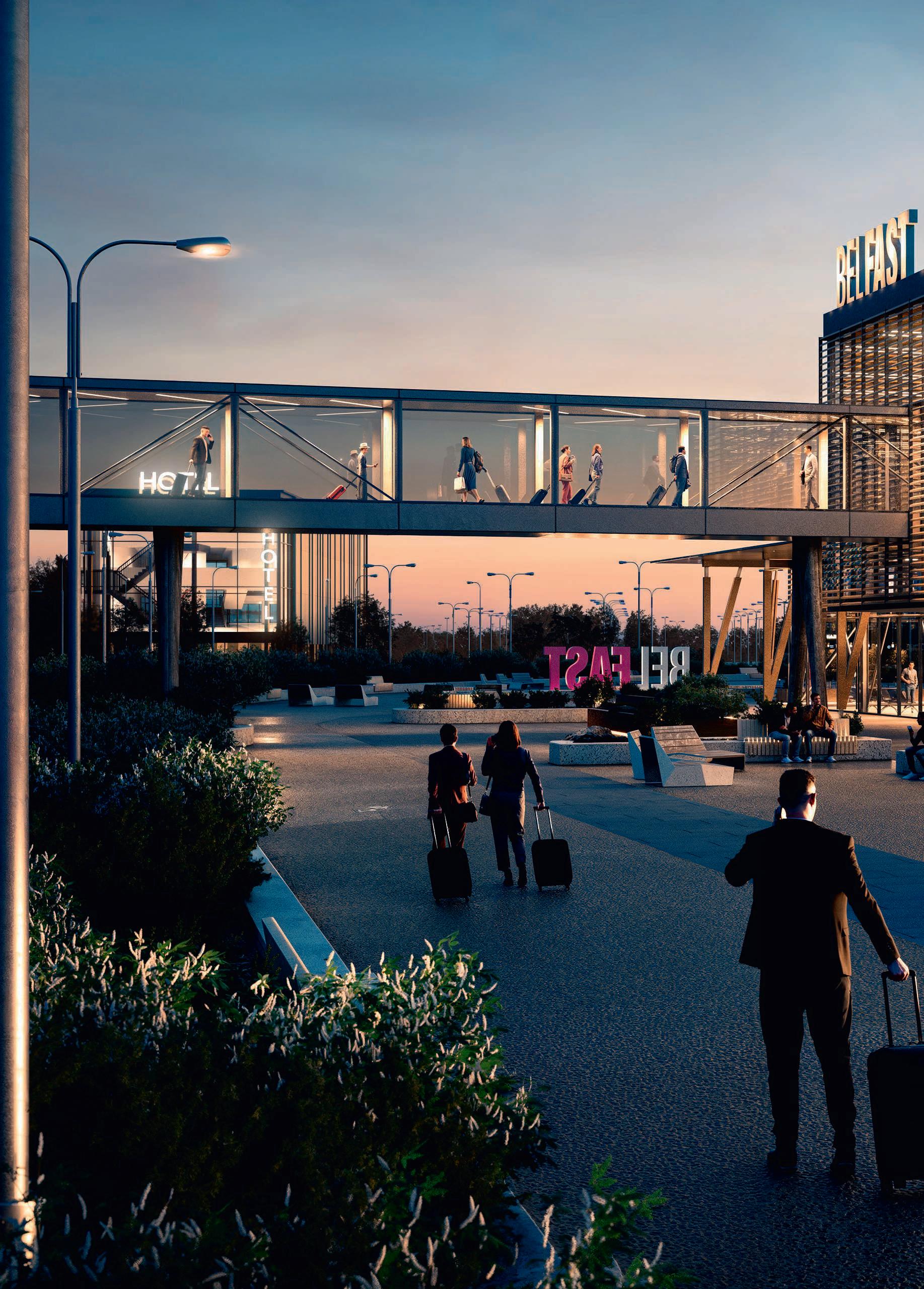




With the market for air travel to and from the island of Ireland forecast to double to over 90 million passengers by 2040, Matthew Hall, chief executive at Belfast City Airport, spoke to Ambition about what the Northern Irish airport is doing to enhance air connectivity, unlock investment in local infrastructure, and increase economic growth and prosperity in a sustainable way.

The rising demand for air travel means that Northern Ireland’s airports will need to handle around 21 million journeys a year by 2040, with 7 million passengers forecast to fly into and out of Belfast City Airport alone.
“The future for Northern Ireland is rightly ambitious and it’s vital that we constructively address the need for improved connectivity to enable this potential to be realised. We can’t simply assume this will happen”, explains Matthew Hall, chief executive at Belfast City Airport.
To enable this growth, Belfast City Airport recently unveiled its transformational draft Master Plan 2040, which has the potential to unlock up to £200 million in private investment, support thousands of jobs, and deliver a £1.7 billion injection into the Northern Ireland economy annually.
“Every airport on the island of Ireland will need to play its part in meeting future demand, and our draft Master Plan showcases our commitment to doing this”, Matthew continues.
“As an island off an island, Northern Ireland is physically separated from the rest of the UK and air travel plays a vital role in keeping us connected.
“While domestic UK travel will still account for over 60% of Belfast City Airport’s business, much of this growth will come from improved connections to global cities and European hubs, as well as the all-important leisure destinations.”
The delivery of Belfast City Airport’s draft Master Plan is a once-in-ageneration opportunity that will benefit passengers and businesses across the region, doubling the airport’s workforce to over 2,200 people and facilitating growth of its apprenticeship academy and award-winning community engagement programme.
Additionally, it will accelerate key sustainability ambitions, including the exciting opportunity to deliver a new rail halt – potentially becoming the first
airport on the island of Ireland to be connected by rail.
“We want more passengers to arrive by public transport and leave their cars at home, hence a focus on greener journeys within the draft Master Plan”, adds Matthew.
“We’ve recently entered a pioneering public-private partnership with Translink to conclude a feasibility study for a new rail halt linking the airport with Belfast city centre on the Bangor line, and we look forward to exploring this initiative further.”
While passenger numbers are expected to grow from 2.4 million a year to 7 million a year over the next 15 years, the rate of growth in annual Air Transport Movements will be less pronounced.
As part of the consultation period, the airport is exploring adjustments to its operating hours to allow for some additional scheduled flights beyond the current 15-hour daily limit.
Importantly, this growth can be achieved without any change to the airport’s existing noise contour limit through the introduction of cleaner, quieter, new-generation aircraft.
“Investing in airport infrastructure is a high-impact lever to enable growth, driving productivity and international competitiveness”, explains Matthew. “To better accommodate future passenger demand, we need to invest in our own infrastructure, guided by the opportunities and constraints within our current airport campus and the surrounding area.
“Our vision would be unlocked through a potential private investment of up
to £200 million which would include extending the terminal, adding new aircraft stands, extending the apron and taxiways, improving surface access facilities, and opportunities to provide complementary developments to further growth, including a new hotel and retail forecourt.”
The required growth at Belfast City Airport will support the Northern Ireland Executive’s Programme for Government, helping to deliver a high performing, competitive economy, tackling disadvantage, promoting inclusion, and delivering on climate change.
Matthew concludes:
“As the UK’s most punctual airport for 2023 and 2024, and the UK and Ireland’s most convenient airport, we are already delivering an excellent experience for our passengers every day.
“Our draft Master Plan outlines how we can continue to play the same key role we play today, but in a bigger market.”
If Belfast City Airport is unable to meet growth in passenger demand, there will be constraints on Northern Ireland’s air connectivity which would frustrate ambitions to improve economic productivity, increase foreign direct investment, grow tourism, and create more jobs through activity at the airport.
“We are now seeking views from our community on our draft Master Plan.
“We want to hear from passengers, local residents, stakeholders, and you as NI Chamber members. All feedback will be considered before the publication of the final plan early next year”, finishes Matthew.
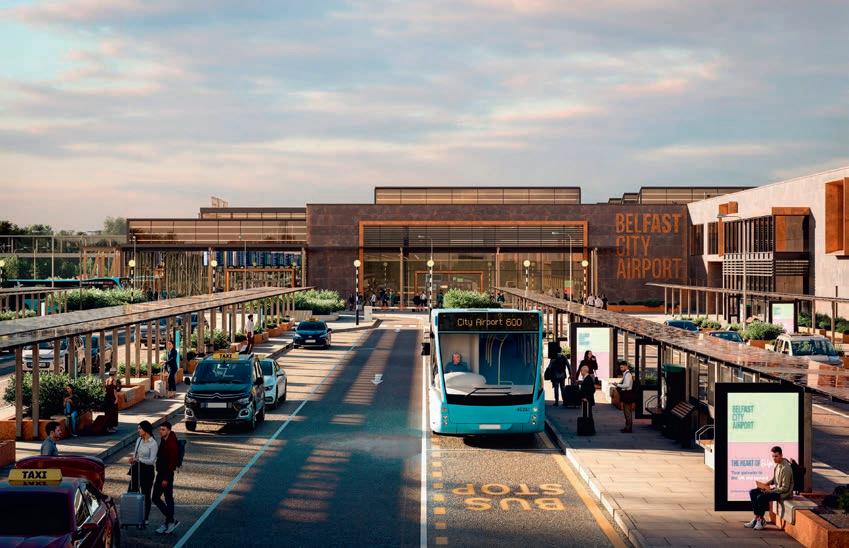































Further growth, performance and sustainability are the three key priorities for McKeever Hotels as it seeks to build and extend its reach on the island of Ireland and beyond.
The intent was revealed by Managing Director Eddie McKeever at a stakeholder event to launch the Group’s five-year strategy, ‘Beyond Now’.
Building on the positive performance of the last three years, the ambitious plans reflect the World Tourism Organisation’s 2030 vision to enhance the guest journey through sustainability, personalised experiences and technology.
“While our strategy remains growth focused, we want to do so in a way which creates a harmonious balance between success, family values, service excellence and community culture,” said Managing Director Eddie McKeever.
Having added two new properties to the Group since 2023 (The Lodge, Coleraine and Armagh City Hotel), taking its turnover to over £25 million across its seven-strong portfolio, the McKeevers will continue to seek further opportunities to expand with the Republic of Ireland and Scotland on the target list.
The growth ambitions are underpinned by a further £3 million capital expenditure across its hotels, with the intention of both
The Lodge and Armagh City achieving 4-star accreditation by 2027.
“While our current capacity is 480 rooms across seven locations, we aim to increase occupancy levels by around 10% through a combination of competitive pricing, improved guest experience and a new Central Reservations System,” added Eddie.
The data-driven system will become a central hub for all bookings, enabling smarter pricing, improved profitability and enhanced guest loyalty. It will also help McKeevers to deepen understanding of customer preferences and tailor experiences accordingly.
“While our strategy remains growth focused, we want to do so in a way which creates a harmonious balance between success, family values, service excellence and community culture.”
Quality food and beverage will remain a cornerstone of the McKeever experience, with a newly appointed Group Food & Beverage Executive to lead innovation across all properties. This will be furthered through a centralised purchasing platform to improve efficiencies and cost effectiveness.
The McKeevers will also continue to support and celebrate NI’s agri-food sector with each hotel showcasing its own signature dishes including a distinctive ‘McKeever Breakfast’ experience.
Sustainability remains at the heart of the Group’s long-term vision. Its ESG commitments will focus on renewable energy sources, improving operational efficiency and supporting the communities in which it operates through local employment and supplier partnerships. Looking ahead to its 40th anniversary in 2026, Eddie McKeever concluded: “Our strategy sets out a clear path for continued growth, innovation and community impact. By 2030 we have the potential to employ 600 people with a Group turnover of £45 million, all of which will be driven and underpinned by the family values that have successfully defined the brand for the past four decades.”




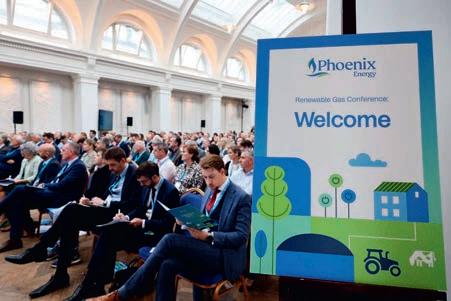


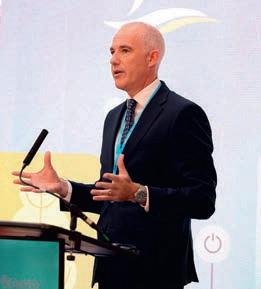




On 23rd October, national and international speakers addressed 240 delegates gathered at Titanic Hotel, Belfast, for Phoenix Energy’s fourth annual NI Renewable Gas Conference. The event, which has grown momentum over the past four years, brought together key stakeholders from across the energy, agriculture, and transport sectors to explore the vital role renewable gas will play in Northern Ireland’s transition to net zero. Throughout the day, discussions focused on the strategic role of renewable gas in decarbonising Northern Ireland’s wider energy system, the development of a Northern Ireland Biomethane Strategy to unlock investment and market growth, and the showcasing of leading-edge projects from Northern Ireland, Great Britain, and across Europe.
Key speakers included Jonathan Martindale, Director of Business Development at Phoenix Energy; Derek Hynes, Managing Director of NI Electricity Networks; Gerard Carlin, Director of Networks & Innovation at SONI; Russell Smyth, Partner and Head of Corporate Finance at KPMG Ireland; Helen Edwards, CEO of Ceres Energy; Carl Arntzen, CEO of Worcester Bosch; and David Surplus OBE, CEO of B9 Energy Storage. This year the conference facilitated a cross-party panel of MLAs and MPs who shared their perspectives on the policy and regulatory frameworks needed to accelerate renewable gases’ role in the energy transition. Collectively, the conference speakers underscored the urgent need for collaboration, innovation, and investment to realise Northern Ireland’s renewable gas potential.



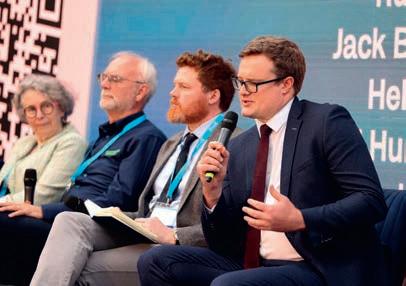

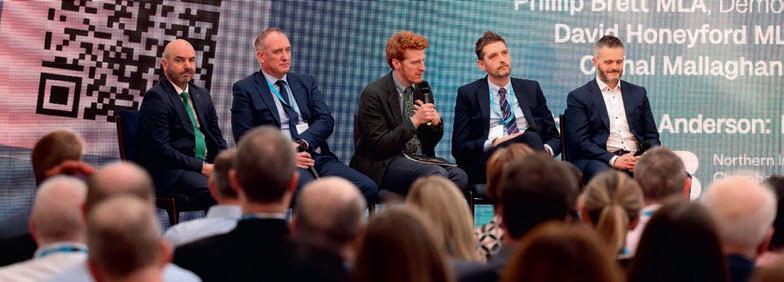


1. Pictured at the conference are Paddy Larkin (Mutual Energy), Gerard Carlin (SONI), Kailash Chada (Phoenix Energy), and Derek Hynes (NI Electricity Networks) as they launch ‘An Energy Consensus - Developing a Regional Integrated Energy System’.
2. Guests network at the Titanic Hotel.
3. Jonathan Martindale, Director of Business Development at Phoenix Energy.
4. Jonathan Martindale welcomed delegates to the NI Renewable Gas Conference.
5. Members of the panel - ‘Energy Synergy: Unlocking the potential of Integrated Energy Systems.
6. 250 delegates attended the conference at the Titanic Hotel.
7. Russell Smyth (KPMG) took to the stage to kick off Theme 1 (‘Biomethane Market Development’).
8. Jack Blakiston-Houston, BH Estates, addressed the room to discuss strategies for further biomethane development.
9. Helen Edwards, CEO of Ceres Energy took to the stage to share considerations from the GB biomethane market.
10. Theme 2 concluded with a panel discussion focused on ‘Strategies for Success’ in a biomethane market.
11. BBC’s Jim Fitzpatrick hosted this year’s conference.
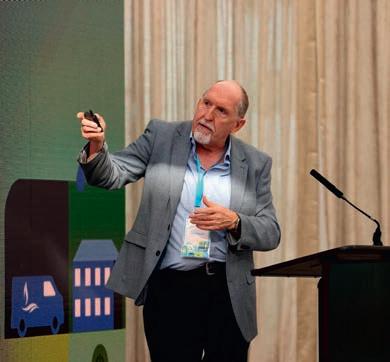

12. David Hurren, CEO of DAH Renewable Consulting addressed the room and shared opportunities and lessons for biomethane in Northern Ireland.
13. Iain Hoy, Energy Transition Manager at Phoenix Energy took part in the Theme 2 panel discussions.
14. Delegates had the opportunity to hear from Carl Arntzen (Worcester Bosch), who provided insights into Hybrid Heat Pumps.
15. David Surplus (B9 Energy Storage) took to the stage to discuss enabling scalable green methanol.
16. John Baldwin from CNG Services Limited took to the stage to open Theme 4 ‘Accelerating Progress: Energy Innovations for a Sustainable Future’.
17. Theme 3 kick started a ‘Cross-Party Dialogue’ with local MLA’s and MPs, Robbie Butler MLA (Ulster Unionist Party), Matthew O’Toole MLA (Social Democratic & Labour Party), Phillip Brett MLA (Democratic Unionist Party), David Honeyford MLA (Alliance Party) and Cathal Mallaghan MP (Sinn Féin).
18. N-Gen Energy Managing Director, Gareth Mills addressed the room as he discussed the challenges and opportunities around green hydrogen development in the UK.
19. Josja Roest from Rheem Manufacturing Company closed Theme 4 of the NI Renewable Gas Conference.
20. Utility Regulator NI Head of Water & Gas Price Control, Ciaran MacCann discussed a ‘Call for Information on Future of Gas Network Price Controls’.
Alot has happened over the past four decades since McCloskey International set up shop in Ontario, Canada, and there’s a lot to celebrate. It has gone from a simple trommel production firm to one of the world’s leading mobile equipment manufacturers, with an engineering and R&D hub in the heart of Tyrone.
Founded in 1985 by Paschal McCloskey, a native of Dungiven, the company began life producing trommel screens for the materials processing industry. “Paschal built the first trommels, then moved into stackers,” recalls Darren McKnight, vice president at McCloskey International. “The business continued to flourish in Ajax, Ontario, Canada, and in 2000 the company moved to Peterborough, Canada, to accommodate growth and expand production capabilities”.
In 2007 McCloskey acquired Northern Ireland-based Viper International, which manufactured mobile vibrating screens for the aggregates and recycling industries. “This was instrumental in allowing McCloskey International to break into the crushing and screening market. Through time we opened four purposebuilt facilities, and the company’s ambition at that stage was to create a hub for screening back in Tyrone. That’s when Northern Ireland became integral to the company.”
Fast forward to 2025, and McCloskey International operates manufacturing plants in Canada, Northern Ireland, and India, employing more than 500 people worldwide with 300 people across its Northern Ireland sites alone. “Here really does influence the wider business. It’s where we do 60% of our total production and it allows us to benefit hugely from the strong engineering industry here. That network helps us stay competitive, and it’s a real advantage,” says Darren.
Those local facilities include Granville Industrial Estate, Ballynakilly, and Clonoe, supported by an aftermarket spares hub and a network of subcontractors that amplifies employment throughout the region.
The company’s product line now includes crushers, screeners, stackers, and trommels. Its equipment powers industries as diverse as aggregates, construction, demolition, mining, landscaping, and recycling.
Another major milestone in the business’s timeline came in 2019, when it was sold to Metso Corporation, the Finnish industrial group listed on





Tyrone-based McCloskey International marked its 40th anniversary this year. Vice President of the firm, Darren McKnight, discusses the company’s ascent to becoming a world leader in processing equipment and how its Northern Ireland base is at the heart of that growth.
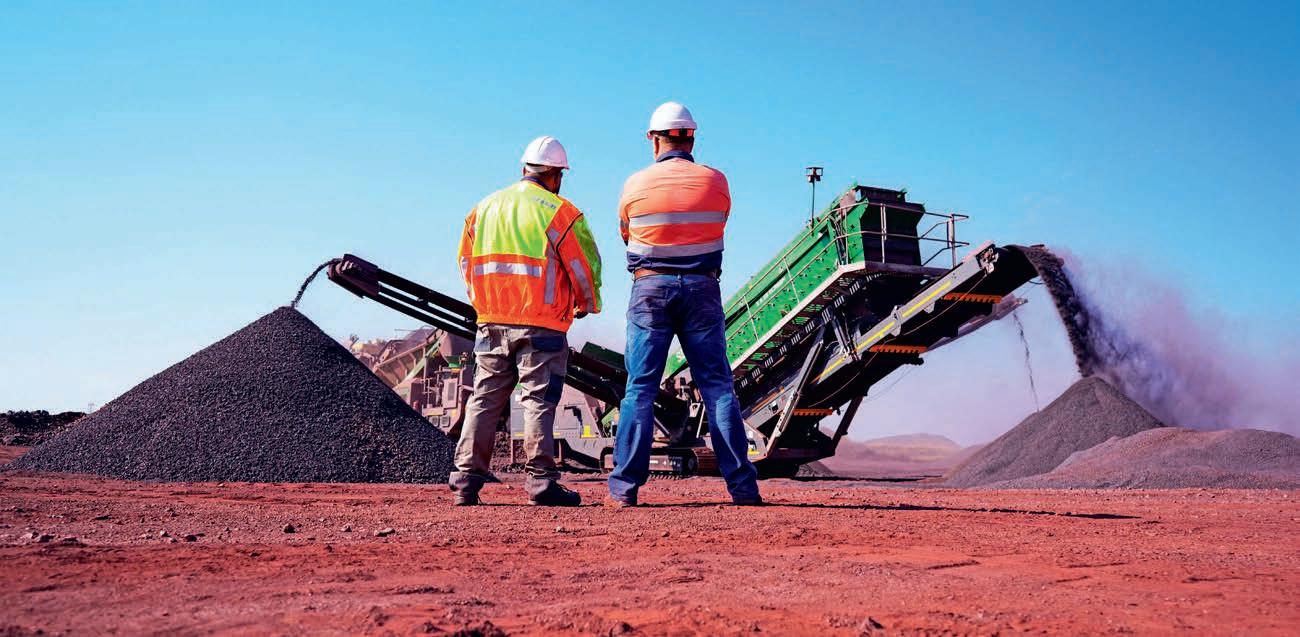
Nasdaq Helsinki. “Moving from a private company to a corporate organisation was a change, but a positive one. Metso has continued to invest in us. We’ve just finished a new office block, a fourbay factory, and a dedicated R&D hub. We’ve always done R&D here, and this investment in a purpose-built facility will take it to the next level.”
Being part of Metso has brought new strength. “The big benefit is the backup of a large corporation,” Darren says. “It means we can collaborate with a wider network and share knowledge with other businesses in the group. While we remain a standalone business, we have that support network. It’s a strong synergy.”
Meanwhile, its 410,000 sq ft Peterborough plant in Ontario continues to serve as a major production and assembly base, supported by manufacturing operations in India to supply Asian and Middle Eastern markets.
Asked about the evolution of that production line, Darren continues, “We’ve found that over recent years, the expectation levels have completely changed in our industry. The technology that goes into our machines is continuously evolving. Our design engineering team ensures we stay ahead of the curve when it comes to the change in technology. Production line quality is paramount as these machines could be working in quarries in remote locations with mixed terrain around the world; they have to be reliable and that reliability starts in Northern Ireland.”
Perhaps the latest industry shift has been the demand in the market for electrification. “There’s been a clear requirement towards electrification in some regions. We’ve invested a lot of time and product development in that range. We started by launching dual-power
“Here really does influence the wider business. It’s where we do 60% of our total production and it allows us to benefit hugely from the strong engineering industry here. That network helps us stay competitive, and it’s a real advantage.”
machines, and last year we developed further when we released our first fully electric crushers. While this has been a significant change in design, it has been an exciting evolution for us.”
Even as electric models gather momentum, the company continues to advance its traditional hydraulic lines. “We have to stay adaptable, and it’s about offering the full range while gearing our skills around electrification.”
The Northern Ireland workforce is hugely important to the wider operation, and Darren says investment in that team is key to future success. “When it comes to skills, you never stop developing. It’s about making sure we have the next generation ready for the next 20 years. We have succession plans in place, and we’re constantly investing in people, making sure we’re ready for whatever direction the industry takes.”
The company works closely with local colleges to nurture new talent. “We bring new apprentices in every year, into design, the shop floor, and engineering. We give them the opportunity to learn as they go with the chance to progress throughout the business,” he says. “Growing our talent internally is important to us and I can speak from experience. I joined the company 18 years ago as transport manager and the company gave me the skills to grow into my current role.”
The result, he says, is loyalty. “We’ve created one of the most loyal teams you’ll find. People have real pride in the brand. There’s a broad mix of local people and those who’ve moved here from further afield. We also have remote staff based across England, Germany, and America. It’s a global business, but it feels very connected.
“We have also created a loyal dealer network that ensures responsiveness in a business that has international reach,” he adds. “We rely on our dealers. They keep us updated on market shifts and regional demand. Every market is different and we need to respond accordingly to the demand in each region.”
As it enters its fifth decade, the business remains entrepreneurial. “You never know what the next ten years will bring: tariffs, global shifts etc but whatever it is we will strive to continue to be recognised globally for our customer success. Scaling up is important, but so is staying agile. That entrepreneurial DNA that built McCloskey International is still at our core.”
The company’s 40th anniversary celebrations included the opening of the new Granville factory and a global dealer event at Titanic Belfast. “It was a thank you to our employees, our dealers, and everyone who’s been part of the journey.”

Velocity Pro Gear, the global leader in high-performance tool bags, has invested £900,000 to fuel its next phase of worldwide growth, supported by Danske Bank under the British Business Bank’s Growth Guarantee Scheme.
This investment has enabled the launch of the world’s first trackable tool bag and companion app, cementing Velocity’s position as the benchmark brand for tradespeople across the globe.
Founded by tradespeople, Velocity Pro Gear is renowned for designing rugged, purpose-built gear that meets the realworld demands of professionals. With 17 patents granted and pending, its latest innovation integrates smart tracking technology with a secure tool register app, developed in partnership with insurance providers, to combat tool theft and transform jobsite efficiency.
Since Adam Gilmore acquired the
business in late 2023 with Danske Bank’s support, Velocity has relocated its operations to Newtownards, Northern Ireland, and achieved a 120% growth in its first year. From this base, the company has built a distribution footprint across the UK and EU, with rapid expansion into France, Sweden, Greece and soon Italy. Velocity’s direct-to-consumer orders already reach as far afield as Japan, Australia and North America, proving that demand for innovation in the trade sector is truly worldwide.
Danske Bank has been a trusted partner to Adam Gilmore’s ventures since 2014, contributing more than £3 million in growth support. Its latest funding empowers Velocity to scale production, invest in AI-driven retail experiences such as live shopping and avatar-based purchasing, and co-develop new tradespecific gear with leading brands such as Stabila.
The Growth Guarantee Scheme is the successor to the Recovery Loan Scheme. It is designed to support access to finance for UK smaller businesses as they look to invest and grow. The Growth Guarantee Scheme launched with accredited lenders in July 2024, with a wide range of products supported by different lenders, including term loans, overdrafts, asset finance, invoice finance and asset-based lending.
The Growth Guarantee Scheme can generally support facility sizes of up to £2m and provides the lender with a 70% government-backed guarantee.
Velocity Pro Gear’s Managing Director, Adam Gilmore, said: “This investment allows us to expand Velocity Pro Gear globally. Launching the world’s first trackable tool bag is just the beginning; we’re setting a new worldwide standard for how tradespeople protect and manage their tools. Danske Bank’s support has gone far beyond finance; they’ve taken the time to understand our business and open doors we never thought possible.”
Ian Moore, Senior Business Manager at Danske Bank, said: “Velocity Pro Gear exemplifies the kind of innovative, high-growth business that Danske Bank is proud to support, and that Northern Ireland can be proud of. Their relentless focus on quality, customer insight and technology is driving global change in the industry. We’re excited to support their journey and look forward to seeing Velocity continue to scale worldwide from its base in Newtownards.”
Reinald de Monchy, Chief Banking Officer, British Business Bank, said: “The Growth Guarantee Scheme is designed to give small businesses the confidence to expand and unlock their potential. Velocity Pro Gear exemplifies this ambition, and we look forward to seeing the jobs they will create while supporting tradespeople in Northern Ireland and beyond.”


Re-Gen, one of Europe’s leading recycling companies, has been named among Ireland’s Best Managed Companies. The award, which celebrates outstanding business performance, was presented at a ceremony in Dublin recently. Eight new businesses have been awarded the Ireland’s Best Managed Companies (BMC) accolade at the 17th annual awards programme. This year, Deloitte recognised 115 companies from across the island of Ireland at the awards, including 25 companies from Northern Ireland. The network of companies has a combined turnover of more than €22 billion and provides employment to over

62,000 people across a range of sectors from technology and healthcare to construction.
A thorough judging process precedes the recognition each year, evaluating the entire management team and the business strategy of each company. The judges examine a wide range of areas when assessing Ireland’s top privatelyowned businesses, considering each business’s strategic planning, governance standards and financial performance in addition to each organisation’s culture, talent strategy and how they are innovating year on year.
Commenting on the award, Joseph Doherty, chief executive of Re-Gen,
said: “We are immensely proud to be awarded the Gold Standard by Deloitte. This recognition reflects the dedication of our 350-strong team in Newry and the innovation that drives us. We work in a hugely technical industry, but we ensure all our staff understand and work towards our mission to decarbonise the environment. We do this by recycling black and blue bin refuse on behalf of councils throughout the UK and Ireland. I am delighted that Deloitte has recognised the dedication and innovation of our team and our vital role in such a complex industry.”
Aislean Nicholson, partner at Deloitte in Belfast, said: “Congratulations to

all the winning companies on their achievement. The Best Managed Companies programme offers a valuable platform for indigenous businesses across the island of Ireland. It’s encouraging to see new companies based in Northern Ireland being recognised for their innovation, resilience and commitment to excellence, alongside several longstanding participants who have achieved Gold and Platinum status for consistently meeting the programme’s high standards over the years.”
Glenn Shanley, head of AIB Corporate Banking, said: “Ireland’s Best Managed Companies is a showcase of what we see daily in AIB – the incredible strength,
ambition and resilience of our indigenous companies. The process is a celebration of strong management teams and the energy they bring to the business world. We can see many shared traits in the 2025 winners – for instance, a willingness to face challenges head on and turn them into opportunities, embedding sustainability as a priority and creating a culture in which people are comfortable with sharing opinions and challenging each other. Congratulations to all winners I wish them every success in the coming year.”
Joseph Doherty concluded: “We now operate two state-of-the-art recycling facilities in Newry. Blue bin refuse
is processed at one facility specially designed to extract high quality recyclate which then re-enters the circular economy, and our new state of the art MSW (Municipal Solid Waste) site has been designed using leading technology and to accommodate future advancements. As we continue to grow our business, we are dedicated to ensuring we manage our team, process and facilities to the very best of our ability. We are proud Deloitte has recognised our efforts here.”



When Chris Sherrard became editor-in-chief of The Irish News early last year, he faced the challenge of transforming a legacy print title for the digital age, writes Emma Deighan.
A Portadown native and lifelong reader of the paper, Chris Sherrard’s journalism career spans the lengths of Ireland and Great Britain. “I wasn’t coming in with my eyes closed. I knew as a reader what was good and what to change,” he begins.
Before studying journalism at the University of Sunderland, Chris worked at the Portadown Times, in a newsroom he describes as “a giant of local media in those days”. He then joined the Ballymoney Times. A stint with Sky in England followed, but home called again, and soon The Daily Mirror beckoned, the signature masthead of Reach plc, the UK and Ireland’s largest commercial news publisher.
It was there where Chris found himself on the front line of digital transformation. “I rose through the ranks to become editor in chief of Reach Ireland, overseeing eight websites, three national newspapers and the magazine RSVP,” he says. “By the end I was managing all editorial operations for Ireland and launching IrishStar.com for audiences in the States.”
However, it was Belfast Live, launched ten years ago this year, that marked Chris out as the digital pioneer he is today. “It started as an idea in my head that I wanted to bring to life, and thankfully I got the backing. Belfast Live quickly became a recognised and trusted brand. Before that, there was only The Irish Mirror online, but I wanted Belfast Live to be different, not a carbon copy. I built it around clear pillars and a positive tone about the community, not just hard or sad stories. I wanted to champion the area and build our audience.”
The formula worked, and the model was replicated everywhere from Dublin to Galway and Yorkshire to London, establishing Chris as a key figure in Reach’s digital growth. That job would see him live in the south and across the water. Returning to home “for a change” coincided with the departure of longserving Irish News editor Noel Doran. “The stars aligned. It worked out well,” Chris continues.
Eighteen months on, he has delivered one of the most significant newsroom restructures in the paper’s 134-year history. “It’s been a complete overhaul,” he says. “Before the restructure, around

70% of the newsroom’s focus was print; now nobody’s primary focus is print. The changes are about shifting mindsets.”
Six new roles have been added to the Irish News’ 80-strong editorial and marketing teams: marketing and subscriptions manager Rachel Bolton, deputy digital editor Gareth Fullerton, audience editor Kathryn McKenna, weekend editor Helen McGurk, video editor Dylan Hegarty and journalists Conor Sheils and Hannah Patterson, with Aeneas Bonner promoted to deputy editor.
Irish News digital editor Ryan Smith, former successor of Chris at Belfast Live and editor of New York-based Irish Star, has also been instrumental in boosting the paper’s social channels and digital reach, recently earning the title ‘Best Use of Social Media in Media, Podcasts, Broadcast or Publishing’ at the Northern Ireland Social Media Awards.
The reorganisation, Chris says, was purposeful rather than cosmetic. “You have to be joined up commercially too. From day one, editorial and commercial have worked hand in glove to set us up for the long term. I believe in the old theory: you fix the roof when the sun’s shining. We’re in a strong position. We’re the biggest regional paper digitally, but we needed to make those changes.”
Those changes are paying off. The paper’s digital subscriptions have grown by 35% this year, building on a 36% rise last year. It now counts 3,447 digital edition subscribers, more than any other UK regional daily title, with Irish News platforms attracting 1.4 million unique users and more than three million monthly page views.
At the same time, print circulation sat at 20,857 copies for the first half of 2025, an 8% year-on-year decline, still far outperforming English regional


counterparts. “We’re realistic. Print is declining, but single-digit decline is a success story. The Liverpool Echo and Manchester Evening News are well below that, so to be where we are shows how highly engaged our audience remains.”
A renewed focus on video, newsletters and events is key to that growth, and Chris has no intention of forcing audiences into one channel. “Ultimately, we’d love people to subscribe, but we’re not relying on that. Other platforms enable us to monetise through volume. Last month we had 40 million video views across Facebook and X.” It’s a separate but lucrative revenue stream, and it’s growing fast.
He believes success is driven by content tailored to each platform. “If the content isn’t strong, people won’t engage, and that’s what the new structure delivers.”

The Irish News now operates four newsletters, a daily briefing plus weekly editions of Business Insight, The Monday Club and Sunday Selection, reaching 55,000 subscribers and 160,000 registered users. “We’ve put a lot of focus on newsletter strategy. Our open rates are very high. Bespoke newsletters let our business reporters add their expertise and knowledge; it’s almost like reading a dedicated column.”
He also points to the success of the Trading Up business podcast and Workplace and Employment Awards, which are revered by many in the business community. “They showcase what we do best, bringing communities together, celebrating success and creating real opportunities for businesses to connect,” he says.
The paper’s business desk, led by longserving business editor Gary McDonald and supported by journalist Ryan McAleer, has become a cornerstone of that reputation. “When people read a business story in The Irish News, they know it’s true, balanced and well researched,” Chris says. “We put a lot of effort into our business coverage, 12 pages every Tuesday and dedicated pages every day. It’s fundamental to what we do, and that trust translates online too.”
That credibility, he believes, is a major
“By the end I was managing all editorial operations for Ireland and launching IrishStar. com for audiences in the States.”
advantage for advertisers too. “We’re very good at tailoring and targeting ads on the website. Our focus on user journey and trusted content is paying off. We’re seeing great success and are now an essential platform for business audiences here and abroad.”
The Irish News also attracts a growing international reader. “There’s a massive Irish community abroad, and we like to think we’re the place that keeps them connected and fully informed about news, even their local GAA club,” Chris adds.
For him, the secret to future success is multifaceted. “Cross-platform storytelling is where we’ll continue to grow. Whether business, news or sport, we’ll keep telling those stories in different ways to reach wider audiences and keep pace with an industry that’s always changing.”
The figures show he is on track. The Irish News now reaches the largest audience in its history. “We’ve never had a bigger audience than we have now and that will continue. The number of people we’re reaching has never been higher, and six months from now, it will be higher again.”








Colin Hutchinson, managing director and chief financial officer at Fibrus Group, reflects on another successful year for the company. This year, Fibrus has strengthened Northern Ireland’s position as one of the UK’s most connected regions, while fuelling economic growth, completing key infrastructure projects, and supporting local communities.


Our mission since Fibrus was founded has been the same: to bring full fibre broadband to homes and businesses in rural, hard-toreach places, whilst placing the local communities we serve at the heart of what we do.
As we look back on the past year, I am incredibly proud to say that Fibrus has continued to deliver on this promise, transforming connectivity across NI and making a real difference to rural communities.
This summer, we proudly celebrated the completion of Project Stratum, awarded to Fibrus in November 2020. The successful delivery of this £200 million landmark initiative – a once-in-ageneration infrastructure project and the largest telecoms project ever undertaken in NI – marks a defining achievement for the company and the region.
Completed on time and within budget, Project Stratum has delivered lightningfast full fibre broadband to over 81,000 premises across NI.
NI now boasts an impressive 95% connectivity rate, which is 9% higher than the UK average. This is a really crucial statistic and it’s a game-changer for homes and businesses that finally have the digital infrastructure needed to thrive. It’s also a major step toward closing the digital divide, and we’re proud to have played a key role in making it happen.
With Project Stratum complete and major milestones achieved, it was time to reflect on our progress and our impact.
In May, we commissioned Grant Thornton to produce an economic impact report to give us the real picture of the difference Fibrus is making in Northern Ireland.
The report revealed that since 2020, Fibrus has injected £431 million into the NI economy. That figure carries real meaning – it represents real jobs, real investment, and real change for our communities. We’ve created hundreds of roles, strengthened our supply chain, and through our rapid network expansion, connected over 410,000 homes and businesses as of May 2025. Project Stratum alone delivers £50.6 million in potential annual productivity gains, and we’re immensely proud of that impact.
At Fibrus, success is bigger than just connectivity… it’s about community. That’s why social impact remains a key focus, with over £411,000 donated to local charities and grassroots organisations across NI by May 2025.

Through the Fibrus Community Fund, we have invested over £235,000 in Northern Ireland, funding projects to address digital poverty in rural areas, benefitting over 130 community organisations to date.
Through our Play it Forward Fund and sponsorship of Antrim GAA and Coleraine FC, we’re helping communities across NI come together through sport. Sport unites, inspires, and creates opportunities, and we’re proud to be part of that journey.
To date, the Play It Forward fund has invested £60,000, supporting 63 grassroots clubs, with an additional £30,000 set to be allocated this quarter.
Clubs who received funding over the last year include Causeway Giants Wheelchair Basketball Club from Coleraine, Newry Rugby Club, Elite Taekwon-Do NI, based in Bangor and St Brigid’s Camogie Club in Armagh. St Brigid’s used their funding received to run a 10-week programme encouraging more local children to get involved in the sport.
Kerry Toner, chairperson at St Brigid’s Camogie Club in Armagh, said: “The funding allowed us to reach out to a wider set of children and to provide an overall training top so that all of the children felt included and there was no pressure on the parents.
We hope that all of the children remain within the club and continue to enjoy playing camogie with their friends for years to come.”
Now in our fifth year of operations, our year-end financial results showed rapid customer growth, with our annual
revenue rocketing by 67% year-on-year to £29.5million and customer numbers increasing by 45% to 113K, across our NI and Cumbrian footprint (end of March 2025).
We reached the major milestone of becoming EBITDA positive in March 2025, ahead of schedule. With year-on-year EBITDA growth of £13 million, our results show that our business model is strong, sustainable, and backed by our customers. This milestone is a clear signal of the strength and resilience of Fibrus as we continue to grow.
With Project Stratum complete, we’re looking ahead with renewed focus and ambition.
Our mission remains as vital as ever: to champion rural communities and ensure they reach their full potential as engines of growth for NI. From connecting our first customer over five years ago to where we are today, our vision has never wavered. We’re now proudly serving almost 130,000 customers and have reached over 440,000 premises across NI and Cumbria.
This year, we’ve celebrated major milestones, from extending our network to hundreds of thousands of homes and businesses to driving significant social and economic impact. As we reflect on our achievements, we know this is just the beginning.
We remain committed to building stronger connections, supporting local communities, and pushing the boundaries of what’s possible – ensuring rural NI is equipped to thrive now and for generations to come.





























By Kevin O’Loughlin, CEO of Nostra

A few weeks ago in Belfast, I met the managing director of a 200-person manufacturing firm who put it bluntly: “We know technology can help us grow – we just need to know where to start.”

It’s a question echoing across boardrooms from Derry to Newry. Business leaders here understand that growth, innovation and competitiveness now depend on how well they harness technology. The conversation has shifted – from whether to transform, to how to do it securely, sustainably and at speed.
Northern Ireland has always been defined by resilience, creativity and a determination to compete beyond its borders. Today, those same traits are driving a new digital transformation story – one built on AI, cybersecurity and a culture of innovation.
With the opening of Nostra’s new Belfast office, we’ve seen first-hand how Northern Ireland’s appetite for secure, scalable technology solutions is accelerating. Businesses here are ambitious, practical and future-focused – they want transformation that actually delivers.
For years, “digital transformation” was treated like a project. In 2025, it is the business. Technology now sits at the heart of every growth plan, every customer experience, every operational process.
At Nostra, we see this daily. Local companies are embedding AI into how they forecast demand, manage logistics and serve customers. They’re automating manual processes to free their people for higher-value work. They’re using analytics to make faster, data-driven decisions. What’s changed is intent. The focus isn’t on chasing the latest tool – it’s on creating measurable value. The most successful Northern Ireland firms see technology not as an expense, but as a strategic asset. They’re building leaner, more resilient, more competitive businesses because of it.
Not long ago, cybersecurity was an IT problem. Today, it’s a boardroom issue – and increasingly, a business differentiator. As cyber threats become more sophisticated, trust is becoming the true currency of commerce. Whether it’s protecting intellectual property, securing customer data or ensuring operational resilience, cybersecurity has become a growth enabler.
One Belfast CEO recently told me, “We now see cybersecurity as our licence to operate.” That shift in mindset is powerful – and it’s spreading fast. In an interconnected region like Northern Ireland, a single breach can impact entire supply chains. Building cyber resilience isn’t just risk management; it’s brand management. Companies that invest in security signal to partners, regulators and investors that they can be trusted – and in business, trust attracts opportunity. Innovation doesn’t fail because of bad ideas – it fails because it isn’t embedded. Northern Ireland’s most forward-thinking
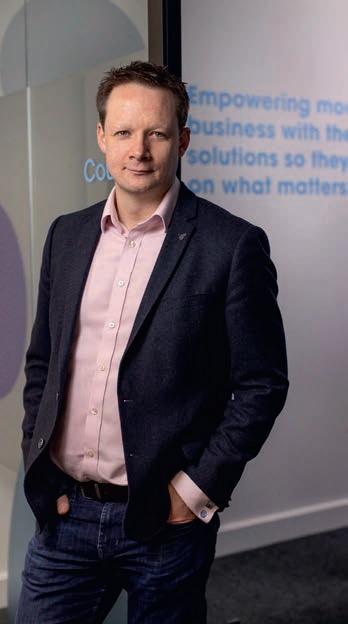
“We know technology can help us grow - we just need to know where to start.”
companies are breaking that pattern. They’re pairing creativity with operational discipline: using AI-driven analytics to detect equipment faults before they cause downtime, deploying chatbots that handle customer queries instantly and applying predictive models to optimise cash flow and resource planning.
These aren’t futuristic concepts. They’re tangible examples of how innovation, when aligned with culture and infrastructure, creates lasting competitive advantage. The lesson is simple: stop treating innovation as an event. Make it a habit.
After two decades helping organisations across Ireland and the UK transform through technology, I’ve seen what works – and what doesn’t. For Northern Ireland businesses, three rules stand out.
First, lead with outcomes. Every digital initiative should start with a business result, not a technology choice. Ask: how will this drive revenue, reduce risk or improve experience?
Second, secure your foundation. Treat cybersecurity as your growth platform.
The stronger your base, the bolder your innovation can be.
Third, empower your people. Technology only works when people adopt it. Invest in digital skills, leadership buy-in and a culture that rewards curiosity and change. These aren’t buzzwords – they’re the operating principles of every highperforming digital business I’ve seen in Northern Ireland this year.
Northern Ireland stands at a moment of real opportunity. We have world-class talent, deep academic partnerships and a growing innovation ecosystem –from Catalyst in Belfast to the research excellence at Queen’s and Ulster University. We have access to both UK and EU markets, a thriving entrepreneurial community and a business culture built on collaboration and pragmatism.
As one Chamber member recently told me, “Northern Ireland’s real advantage isn’t size – it’s our ability to adapt.” In a world where agility matters more than scale, that’s a winning formula. The challenge now is acceleration – turning potential into performance.
AI is already transforming how Northern Ireland businesses work –quietly, efficiently and in ways that matter. A Derry-based manufacturer recently used predictive analytics to anticipate machinery faults hours before a breakdown, saving days of downtime. That’s not hype; that’s progress.
But technology alone doesn’t transform companies – leadership does. Boards and CEOs must now ask: Are we leveraging technology to grow? Are we protecting our digital estate? Are we developing our people to think digitally, not just work digitally?
Sustainable growth today means more than hitting revenue targets. It means ethical AI, secure systems, inclusive cultures and measurable results. The companies that embrace this balance – between innovation and integrity – will define Northern Ireland’s next growth chapter.
Northern Ireland has rebuilt, reimagined and reinvented itself more times than most regions. That same spirit now powers our digital evolution. At Nostra, our belief is simple: technology should help people do their best work, not replace it. When businesses combine that principle with the courage to innovate and the discipline to secure, transformation follows naturally.
The next wave of growth will belong to the leaders who see technology not as a tool but as a mindset – and Northern Ireland has that mindset in its DNA.
Kevin O’Loughlin is CEO of Nostra, one of Ireland’s leading managed service providers, helping businesses across the island transform securely through technology, AI and innovation.
Care for Cancer in Omagh is celebrating after receiving a £1,000 boost from Power NI’s Brighter Communities scheme, money that will go towards much-needed chairs and tables to support the growing number of people who use the charity’s services every day.
Care for Cancer, established in 1988, provides practical and emotional support for people affected by cancer and their families. Among its many services is a specialist bra fitting service, delivered by two amazing volunteers, Susan and Janine. Both women have walked the breast cancer journey themselves and, after benefiting from the service, decided to give back by volunteering and are now also committee members.
Through their lived experiences, Susan and Janine spotted a gap in support and, in 2023, launched the Brilliant Birds support group. Meeting twice a month over tea, biscuits and plenty of laughter, the group now has 95 members, offering friendship, understanding and encouragement to local women affected by breast cancer.
The popularity of Brilliant Birds has soared, and Care for Cancer now urgently

needs more chairs and tables to make sure everyone has a seat at the table. Thanks to Power NI’s donation, the charity can continue to provide a warm, welcoming space for its members.
Janine Lappin, volunteer and committee member, said: “Susan and I are absolutely delighted to accept the Brighter Communities grant on behalf of the Brilliant Birds. This generous donation will allow us to keep supporting women in our community, giving them a place to laugh, talk and share their experiences, it means the world to us.”
Power NI’s Brighter Communities programme has been shining a light on local organisations since 2018, donating over £100,000 to groups making a real difference across Northern Ireland.
Ashleigh O’Neill, the Senior Marketing and Communications Executive at Power NI said: “Care for Cancer and the Brilliant Birds group are a wonderful example of people coming together to support each other through challenging times. We’re delighted to help them grow and continue spreading positivity in the local community.”
“A society grows great when old men plant trees whose shade they know they shall never sit in.” – Greek Proverb When someone chooses to leave a gift in their Will to Queen’s University Belfast- supporting students, advancing research, or strengthening the University community - it is an act of faith in the future; an investment in generations to come. Their gift will help to create opportunities and discoveries they may never personally witness, but whose impact will endure long into the future.
A gift in your Will - even 1% of your estate - can make a real, lasting difference. To learn more about the impact of gifts in Wills at Queen’s, visit go.qub.ac.uk/legacy-gift.

Manager, Sumer NI

Board member, Utility Regulator

Partner, Mills Selig

Sales Manager, WRB Group

Corporate Affairs Manager, Belfast City Airport

Head of Operations, RTU

Associate Director, Grant Thornton

Marketing and Subscriptions Manager, The Irish News


Belfast new joiners Sept 2025 – DWF grows Belfast team with three senior appointments and 16 further new hires.
DWF, the global provider of integrated legal and business services, has strengthened its Belfast team with 19 new appointments across key practice areas. The intake includes a new partner, two directors, three newly qualified solicitors, seven trainee solicitors, and six additional legal professionals.
Deborah Archer has joined as a partner in the finance and restructuring team and brings over 20 years of experience advising financial institutions, corporates and alternative investors. Deborah is dual qualified in Northern Ireland, England and Wales and has extensive expertise across refinances, leveraged finance, acquisition finance, project finance and energy.
Further strengthening the senior team, Jonathan Simpson has joined as a director in employment. Qualified in Northern Ireland, England, Wales and Ireland, Jonathan advises on all aspects of employment law, including tribunal litigation, corporate transactions and workforce planning.
Julie-Ann McCaffrey has also been appointed as a director in the infrastructure, construction and energy team. Dual qualified in Northern Ireland and the Republic of Ireland, she brings extensive experience in construction and procurement law, having acted in many of Northern Ireland’s most significant cases.
Julie Galbraith, managing partner of DWF in Belfast, added: “I am thrilled to welcome all our new colleagues to the Belfast office. These appointments represent significant investment in our people and capability across key practice areas. As we continue to grow, their expertise will help us deliver outstanding service to our clients locally, across the island of Ireland and globally.”
Carson McDowell, Northern Ireland’s largest independent law firm, is pleased to announce the promotion of four outstanding lawyers to its partnership: Faye Phillips, Le-ann Campbell, Rachael McAdorey and Rosie Timoney.
These appointments reflect the firm’s continued growth and its commitment to recognising excellence, leadership and dedication across its teams.
Neasa Quigley, senior partner, added:
“Our clients rely on us for trusted advice on their most important matters, and that trust is built on the calibre of our people. Faye, Le-ann, Rachael and Rosie exemplify the expertise and dedication that define our firm. Their promotion strengthens our team

and enhances the service we deliver to clients across Northern Ireland and beyond.”
Carson McDowell remains committed to setting the standard for legal excellence in
Northern Ireland, advising on many of the region’s most significant transactions and investing in the development of future legal talent.
Ulster Carpets has taken part in the Commercial Interiors Supplier Finder Show.
The one-day event at The Alex Hotel in November – which features a custom carpet from Ulster – connected designers, specifiers, owners, operators and developers with the UK and Ireland’s leading commercial furnishing suppliers.
Joyce McIvor, contract sales director for UK and Ireland, and Irish contract sales executive Joe Radcliffe, attended the event to guide visitors through the various carpet and rug options available from the County Armagh-based manufacturers.
The event proved to be a great opportunity to engage with customers and highlight the different options available to hospitality projects.
Joe explained, “Thanks to our patented weaving technology we have total design freedom that pushes the boundaries of custom carpet design through enhanced colour options and creativity.


“This means we can match any interior design style with a luxurious finish that is completely unique to your hotel.”
Ulster Carpets will also introduce FORM, a sophisticated collection of eclectic designs that can be recreated and recoloured to match your own style.
Joe added, “Our design team has carefully curated this collection to inspire your creativity. FORM can be used as an inspiring starting point to develop your own designs or you can use our Design Portal to recolour the design to match your interior design plans.”
In addition to custom designs and colours, Ulster Carpets also offers a comprehensive stock range for projects that require a faster turnaround.
Joe concluded, “We have a range of different options to meet your needs, and we are looking forward to discussing your next project at the Commercial Interiors Supplier Finder Show.”




The EX30 is a popular EV but it won’t please everyone, writes
James Stinson
Sales of electric vehicles in the UK were up nearly 30% on a year ago in September, accounting for nearly a quarter of all new cars sold during the month.
A raft of newer, more affordable electric cars with improved range is driving the adoption of EVs. The UK government is playing its part too, through a £650m subsidy scheme.
The scheme applies to electric cars costing less than £37,000 and is worth up to £3,750 though most discounts fall into the £1,500 bracket. The subsidy depends on a series of environmental factors relating to the manufacture of each model and the green credentials of the car maker itself. All you need to know is that it’s making electric driving more affordable.
Manufacturers who are either waiting to get their cars approved by the scheme or don’t think they’ll qualify are also reducing their prices to match those benefitting from the government-funded discount.
Volvo has long been a leader in the electric car field and recently joined in by applying a £1,500 discount to its EX30 compact SUV, reducing the entry level price down to £31,560. The price cut is obviously driving demand, with the UK now the single biggest market for the all-electric EX30.
This recent flurry of news prompted us to look again at Volvo’s smallest and cheapest EV.
In many ways, the EX30 is a microcosm of the Volvo brand. Where once Volvo’s appeal was anchored around safety, these days the Swedish carmaker differentiates itself from rivals on styling, and why not? Scandinavian chic is a thing in fashion, furniture and homes; why can’t it be the same for cars?
The EX30 leans into this with a seriously clean and understated
look. That’s most apparent in the cabin, which is as minimalist as you can get, with a swooping lower dashboard section and little else but vertical air vents and a 12.3-inch portrait-oriented touchscreen.
This minimalist approach isn’t for everyone though. If you like all the controls sunk into a giant, centrally mounted touchscreen then you are in luck. But you can take this too far…
Volvo has even done away with a driver’s instrument panel so when you want to see what speed you are doing, you have to glance over at the touchscreen. Even the wing mirror adjustment has to be done through the centre console. There’s a simplicity (and likely cost saving) to this approach but it’s car marmite.
Beneath the skin, there’s the usual electric car fare, with a choice of three powertrains and two different battery types. Entry-level Single Motor versions feature a rear-mounted 268bhp motor with a 51kWh battery, which gives a claimed range of 214 miles. Real-world figures will be lower, depending on everything from the weather, traffic and driving style.
It delivers an impressive 0-62mph time of 5.7 seconds and can charge at up to 150kW, potentially (depending on what charger you use) taking the battery from 10-80 percent in 26 minutes.
The Single Motor powertrain is also be offered in Extended Range form. It uses 69kWh battery, which extends the range to 298 miles.
That battery is also used in the Twin Motor Performance model, which adds a second, 154bhp electric motor on the front axle to give a combined output of 422bhp.
Prices start from £31,560. The Extended Range versions offer more flexibility but cost around £4,000 more.
Three trim levels are offered – Core, Plus and Ultra. Standard equipment includes a rear parking camera, rear parking sensors, automatic LED headlights with active high beam and 18-inch alloy wheels. The 12.3-inch touchscreen system comes with Google built in, while a dashboard-mounted soundbar offers great sound quality.
The range is topped out by a ‘Cross Country’ version, from £47,060, which has increased ride height, all-wheel drive as well as chunky front and rear skidplates for a more rugged look.













ELECTRIFY YOUR FLEET WITH OUR EV CONSULTANCY SERVICE. Whether you are planning to electrify some of or all your eet, Agnew Leasing have the tools and experience to help you nd EVs that suit your business.

James Stinson

Nissan is getting its act together. Having launched the first mass market electric car back in 2010, the Leaf, the Japanese car maker somehow lost its way, becoming a spectator to the EV revolution going on around us.
But with the launch of a completely new Leaf and this stunning new Micra, Nissan has rediscovered its electric mojo.
The Micra has been a Nissan stalwart and a big seller for decades even if it did have a reputation for attracting older buyers… This new Micra is light-years removed from previous versions. For a start, it’s all electric. Then
there are those modern and quirky looks, which will appeal to a wider and younger audience.
By dint of its alliance with Renault, the Micra shares much of its tech with the Renault 5. So, there are similar specs, range and pricing. But where the Renault’s styling is unashamedly retro, the Micra has taken a more cutesy and futuristic turn.
The bubble headlights, which hark back to previous Micras, dominate the car’s looks. Micra designers openly admit they’re designed to make you smile and even give you a ‘welcome wink’ when you turn on the car.
There are two battery options. First up is the 40kWh model with 120hp. This is good for around 190 miles of range. Then there’s a 52kWh battery with 150hp which should give you nearer to 250 miles of range. A heat pump, which helps with efficiency in cold weather, comes as standard.
Both variants support DC fast-charging up to 100kW, with V2L (Vehicle-to-Load)
capability for powering small devices – and they are ready for V2G (Vehicle-to-Grid) integration coming soon.
The differences between the Nissan Micra and the Renault 5 are more subtle inside the car. You do have the options of three different interior colour themes – a black, blue or light grey.
Like the Renault 5, the 10-inch driver’s display and 10-inch infotainment screen are integrated into a single housing. And like the R5, the Micra has Google Maps and Google Assistant built in. But you have to opt for the mid-spec car to get this. Entry-level cars get a smaller driver’s display. The air-con controls are physical buttons underneath the air vents.
The market for all-electric, dinky, city cars looks like it’s hotting up over the next few years. This is Honda’s recently revealed Super-N prototype, which is coming to these shores in 2026.
The Super-N Prototype features the distinctive boxy shape, wheel-at-eachcorner stance, upright silhouette and tiny dimensions that mark out a ‘kei’ class car –Japan’s smallest class of vehicle.
It is built on the same underpinnings as the recently revealed Honda N-One e. The front end features LED headlights with circular daytime running lights surrounding them and a flat front panel.
At the rear, there’s a huge tailgate that runs way down into the rear bumper – this has a blacked-out middle section with ‘Honda’ spelled out across it. Tiny eightspoke alloys sit within the boxy wheel arches, and behind them you can see red brake callipers.
Once inside, this sporty aesthetic is also evident in the blue-accented asymmetrical seats, and the clean, horizontal instrument panel.
A unique feature of the Super-N prototype is the new BOOST mode. Not only does this increase vehicle output to maximise performance, but it also simulates a multi-gear shift with Active Sound Control.
Coupled with dedicated interior displays and coordinated lighting sequences, Honda says this will “ensure a sense of excitement and enhanced driving engagement that is unique to a vehicle of this size”.
“By bringing Honda’s trademark ‘fun-to-drive’ performance to a compact
Three trim levels are offered – Engage, Advance and Evolve. Entry level prices start at £21,495 (including £1,500 government grant). However, the mid-spec Advance with the longer range 52kWh battery looks to be the pick of the bunch. This adds the larger screens as well as cruise control, wireless phone charging, 18-inch alloy wheels, parking sensors and a reversing camera. It starts from £26,995 while the range tops out at just under £30,000 for the Evolve version.
If you want to finance rather than own a new Micra, you can have one from £237 a month, based on a 48-month loan term and a £4,000 deposit.
all-electric model, we believe this is a unique proposition and we are excited for people to experience it from 2026,” says Rebecca Adamson, head of automobile, Honda UK. There’s no pricing information yet but it will likely cost from £20,000 upwards when it arrives here next year.




HMRC assigns a taxable value to cars that are available for private journeys – a percentage of the list price, weighted against vehicles with higher CO2 emissions. Employees then pay Benefit-in-Kind on that figure at the same rate as their income tax band (typically 20% or 40%).
This system provides generous tax breaks for ultralow emission vehicles (ULEVs) – a term encompassing all BEVs and PHEVs emitting 50g/km CO2 or less (at the tailpipe).
• BEVs (0g/km) are taxed at 3% of the list price (2025/26), rising 1% point in April 2026 and 2027, then 2% points in 2028 and 2029 – to 9%. Although it’s a three-fold increase, it’s less than half the nextlowest band.
• PHEVs (1-50g/km) fall into five bands, from 3% to 15%, according to their electric range. They also get a 1%-point rise in April 2026 and 2027, before being combined into a single 18% band in 2028, rising to 19% in 2029.
Incoming changes to PHEV tax from April 2028 coincide with the Euro 6e-bis emissions standard being implemented in the UK. Already in force across the rest of Europe, this reduces the influence of a PHEV’s electric range on its published efficiency and CO2 figures and could push some models over the 50g/km CO2 ULEV threshold.

For more information on how this might affect you, your company or your employees, contact David McEwen, Head of Business Development at Agnew Leasing. David.mcewen@agnews.co.uk
This Christmas, give a gift as timeless as the story of Titanic. Located in the heart of Belfast’s iconic Titanic Quarter, Titanic Hotel Belfast offers a unique blend of heritage, elegance, and award-winning hospitality, making it the perfect corporate gift this festive season.
Titanic Hotel Belfast gift vouchers are an ideal way to thank clients, reward employees, or strengthen valuable business relationships. Whether it’s a monetary voucher, luxurious overnight stay, refined dining at the acclaimed Wolff Grill, or a premium cocktail experience in the historic Drawing Office Two, each voucher offers a memorable experience that reflects your appreciation in a meaningful and distinctive way.

For a truly memorable gesture, vouchers can also be redeemed for elegant Afternoon Tea at Titanic Hotel Belfast, an indulgent occasion featuring handcrafted pastries, freshly baked scones, and savoury delicacies served in beautifully restored surroundings.
Flexible, easy to personalise, and suitable for any recipient, our gift vouchers allow your business to deliver thoughtful recognition and lasting goodwill, well beyond the festive period.
Corporate gift vouchers are available now at www. titanichotelbelfast.com or contact our team on +44 (0)28 9508 2000 telephone or email info@titanichotelbelfast.com for multiple voucher options.


Ulster Tatler’s Fashion & Beauty
Editor, Joanne
Harkness, looks at leather, which remains a standout fashion trend, blending timeless edge with modern versatility.




















Ingredients :
• 1.5 kg Sliced White Onions
• 2l Medium Sweet Cider
• 150g Salted Butter
• 100g Sugar
• 20g Salt
• 500ml Brown Beef Stock
• 1.5l Brown Chicken Stock
• 50ml Soy Sauce
• 25ml Worchester Sauce
To finish :
• 250g Coolea Farm House Cheese
• 1 Sourdough Baguette
• 100ml Olive Oil
• 100ml Cream




Andrew Turner Executive Head Chef


1. Pre-heat the oven to 165c
2. Slice your baguette and toss together with the olive oil and some sea salt. Place on a baking tray and toast in the oven for 5 minutes. When crispy, remove the croutons from the oven and allow to cool.
3. To make the soup, heat a large pot on the stove and add the diced butter to the hot pan to make a brown butter. When the butter is brown, drop in the onions, salt and sugar and cook until the onions are melted and a lovely chestnut brown.
4. Cover with the cider and reduce by half. When done, pour in both stocks and reduce by half again.
5. Cook slowly for approximately half an hour until the soup is rich and full of onion.
6. Taste and season with the soy and Worchester sauce. Add more salt if required.
7. To serve, pour your soup into an oven proof bowl as it’s going to go in the oven or under a grill to melt the cheese.
8. Add a splash of double cream to the soup and float some croutons on top to cover. Now, cover your croutons with a good melting cheese such as Coolea – cover with more than you think you need. Place into a hot oven or under a grill for 5 mins until the cheese has melted and is bubbling. Serve piping hot.







Northern Ireland’s business community continues to show remarkable resilience. Across our manufacturers, service firms and growing tech sector, there remains an admirable spirit of determination. Yet, the findings of NI Chamber’s latest Quarterly Business Insights report are a timely reminder that resilience alone cannot deliver sustainable economic growth. Businesses need an environment that enables them to invest, innovate and compete globally.
While sentiment remains cautiously positive, confidence has moderated since the beginning of the year. Behind the headlines, many firms are operating with tightening margins, weaker cashflow and limited financial headroom. Just over half of respondents report that activity or demand has softened in recent months, and nearly a quarter are now under clear financial pressure, which is the highest proportion in over two years.
This is not due to a lack of ambition or effort. It reflects sustained cost pressures, particularly from wages and taxation, that are stretching the capacity of even the best-managed firms. Rising input costs and the ongoing squeeze on margins leave businesses with little room to invest for future growth or to absorb further shocks.
And yet, businesses are persevering. Over a third report trading well, and most are maintaining investment in skills and training, even as they confront financial strain. That decision to continue developing people in challenging times says much about Northern Ireland’s long-term mindset. Our members understand that talent is the foundation of competitiveness.
But we face a structural skills challenge that must be addressed urgently. Recruitment difficulties remain widespread, with a balance of +84% of manufacturers and +75% of service firms struggling to find the right candidates. The mismatch between workforce capabilities and business needs is constraining productivity and growth. Employers report acute shortages in engineering, digital, finance and operational roles – gaps that are limiting productivity and hindering expansion.
Addressing these shortages requires coordinated action to align skills provision with business need, improve regional talent pipelines and make Northern Ireland a magnet for skilled workers. Because this is not just a hiring challenge; it is a competitiveness issue. Without the right people in place, firms cannot seize new opportunities, innovate effectively or scale to meet demand.
Businesses want to see government follow through on commitments to support growth and strengthen Northern Ireland’s competitive proposition. There is a clear appetite among firms for policies that reduce costs and create stability. It is in this context that I believe a renewed conversation on Corporation Tax reform is important.
However, this must be part of a broader, longterm economic strategy for Northern Ireland, one that prioritises investment in skills, research and development, and infrastructure. Fiscal reform alone cannot transform the economy, but when aligned with long-term investment and a stable policy environment, it can be the catalyst for growth and innovation.
Northern Ireland has shown time and again that it can outperform expectations when given the right tools. The challenge now is to build on that momentum. By working together; government, business and academia, we can create the conditions for sustained and inclusive prosperity.
Kailash Chada, President, Northern Ireland Chamber of Commerce and Industry


Talk to Musgrave - the leading convenience retail experts.
STORES ACROSS SUPERVALU, CENTRA AND MACE IN N.I. 5.2m CUPS SOLD IN N.I. IN 2024
£7m INVESTED IN VALUE £12m INVESTMENT IN STORE NETWORK 2025
Whether you’re looking to convert, sell your business, freehold or leasehold, talk to us. We’re an award-winning family owned business that’s redefining convenience. Through our innovation in food-to-go and store design, we are driving new opportunities for growth. Our strong track record for building better brands is highly recognised. In fact, our Frank and Honest on-the-go coffee brand is now the largest on the island of Ireland.
To find out how we could grow good business, contact:
Barry Holland, New Business and Acquisitions Manager barry.holland@musgrave.ie | 07795 965204 Denis McLaughlin, Business Development Manager denismc@musgrave.ie | 07881 938374
Terence Lagan, Business Development Manager terence.lagan@musgrave.ie | 07775 009699




















